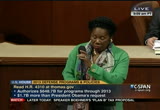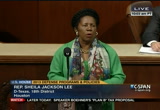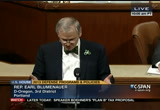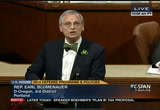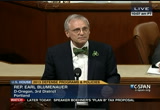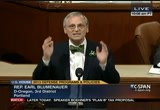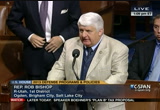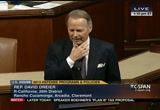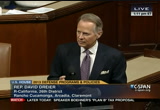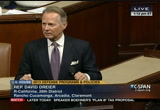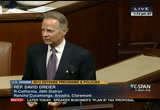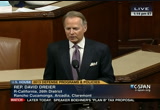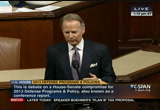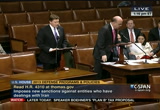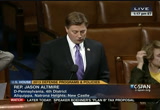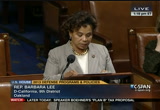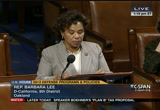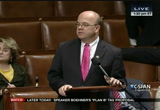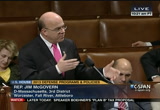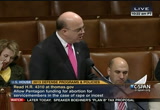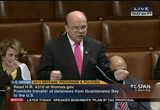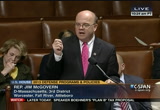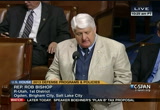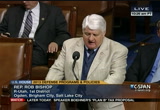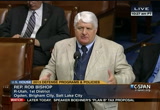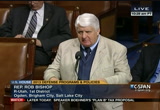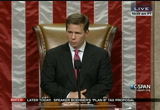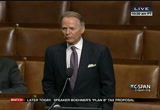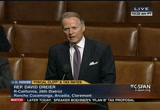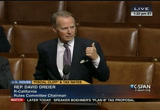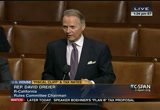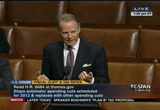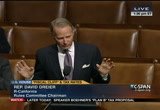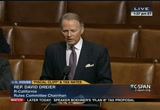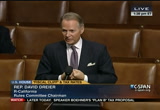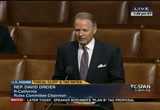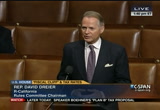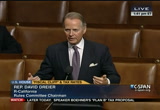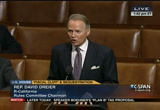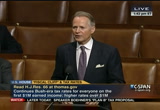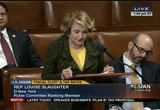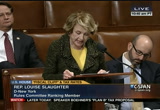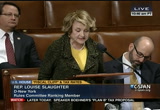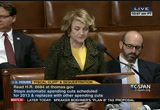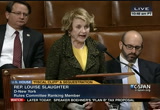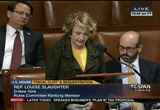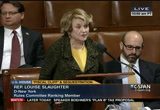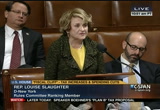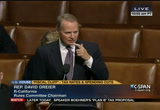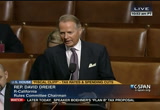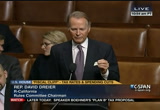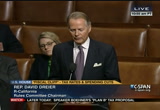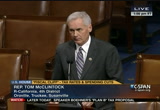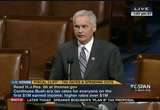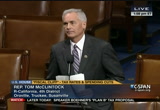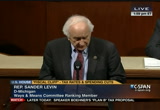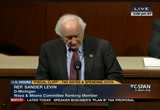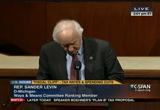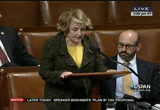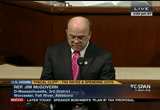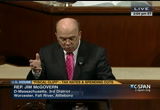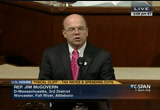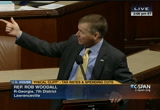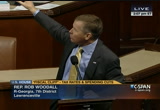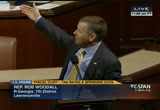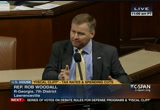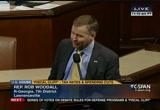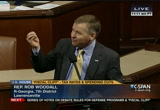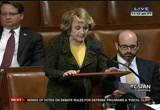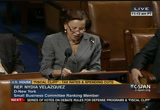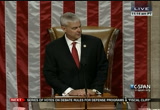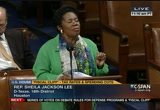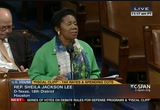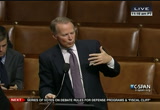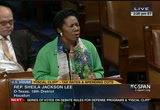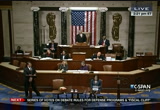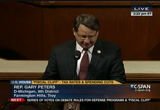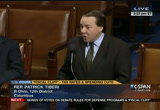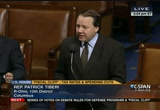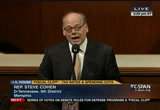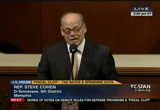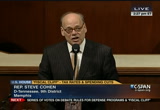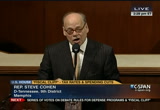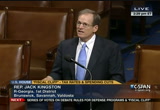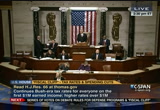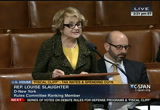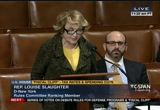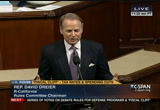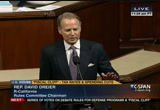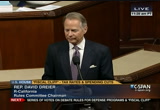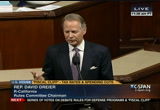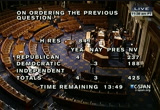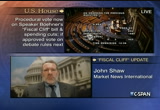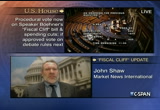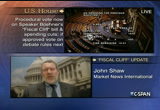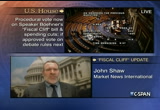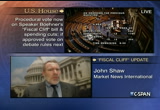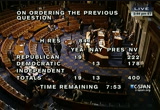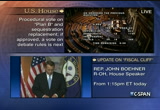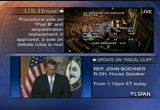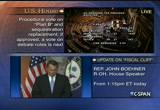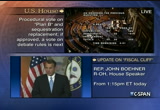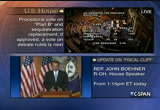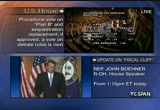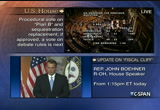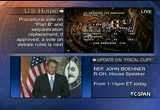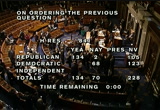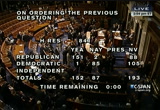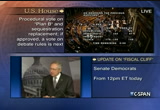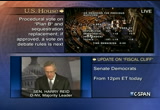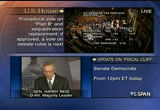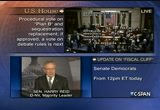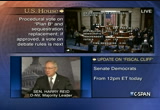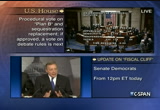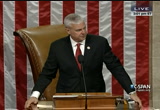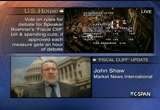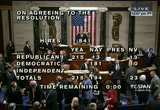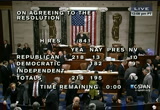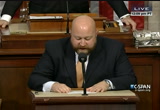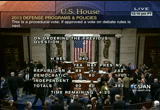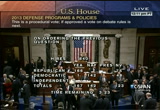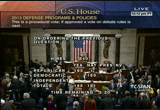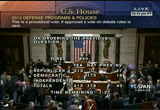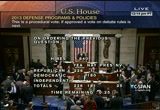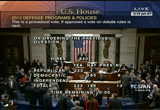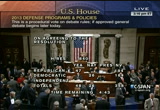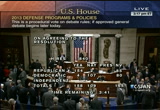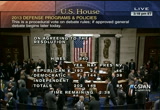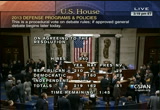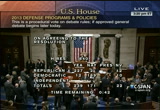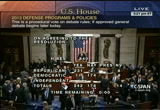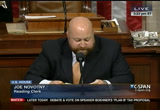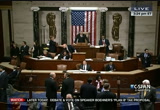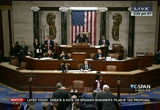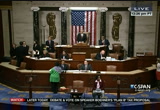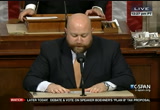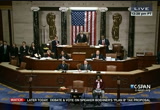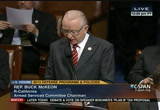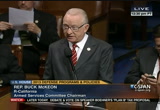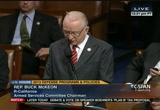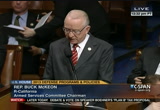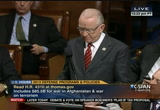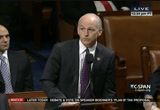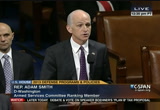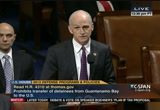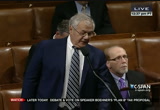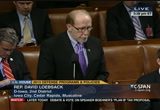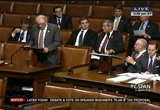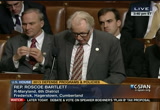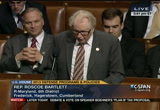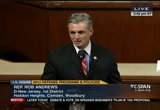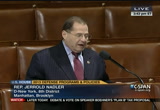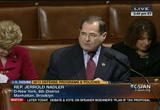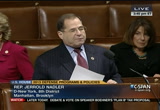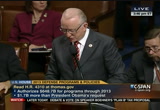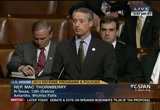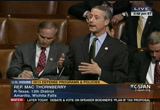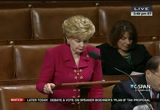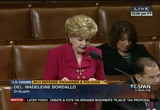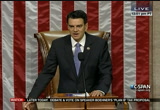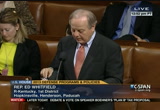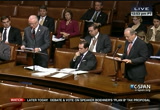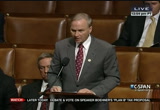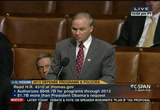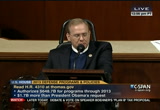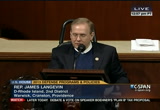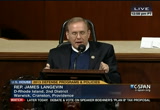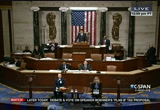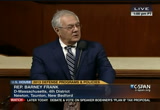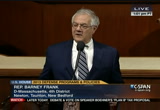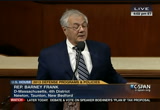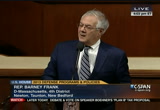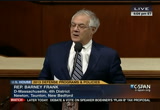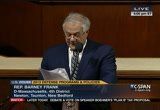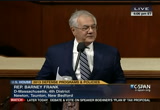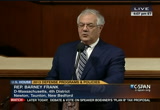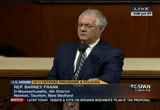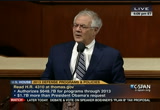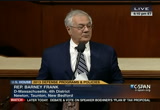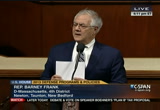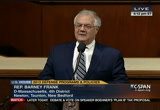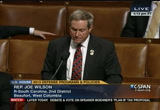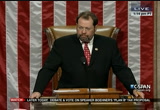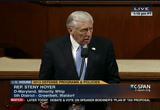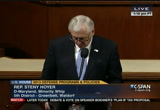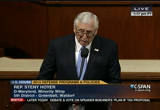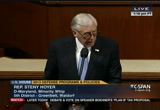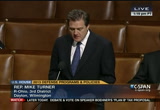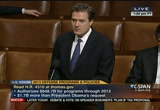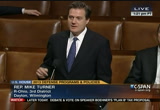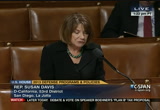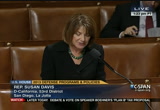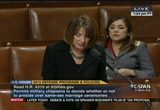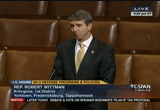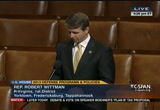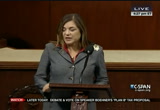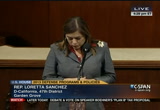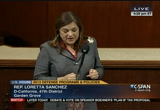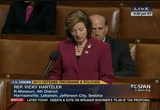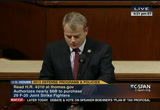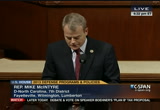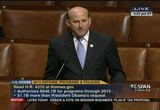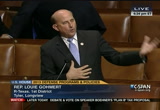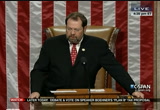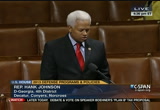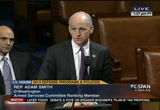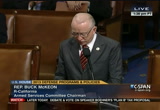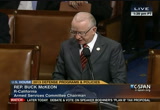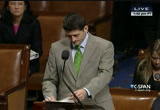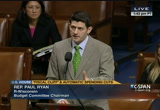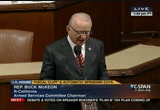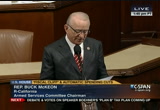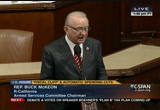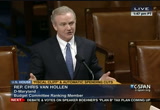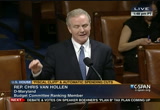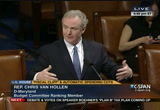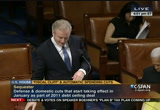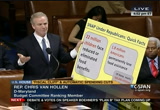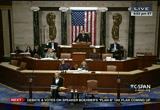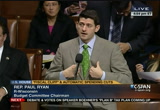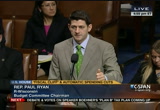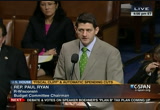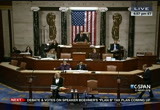tv Public Affairs CSPAN December 20, 2012 1:00pm-5:00pm EST
1:00 pm
mr. speaker -- i ask to address the house, revise and extend. mr. speaker, i too believe in military preparedness. coming from a state like texas where the population of men and women who have served or are serving in the united states military is renowned and appreciated. as i look at the tourists who walk through the halls i wonder which of those young people will take an oath and join the united states military. and so when i see raises for the troops it pleases i think all of us. i'm concerned about the afghanistan timeline. i had hoped that it could be expedited. i certainly do commend the iron dome because we saw it work with respect to israel. i question however the drones that may have collateral damage. but i do think it's important that this bill does in fact make a commitment to protecting the women and children of afghanistan, responds to the issues dealing with sexual assault against military
1:01 pm
personnel and particularly women and it's strong on iran sanctions. . i rise today as well because when we talk about people we talk about men and women in the united states military, we talk about their health. yesterday in the rules committee i raised this point and i raise it again, i'm going to support this bill because i think it will make a leap of faith commitment to finding the cause of triple negative breast cancer. they are usually of a higher grade and size, onset at a younger age, more aggressive, and more likely to metastasize. the survival rate for breast cancer may have increased, but on triple negatives, people are diagnosed and they die, in months. maybe a year. such as my constituent, yvonne, who left a husband and two children. or maybe the young lady who stopped me when i was talking in the race for the cure and said,
1:02 pm
my mother, a hispanic woman, got triple negative breast cancer. we did everything we could and she died within months. apart from surgery, the only relief is to stop the chemotherapy is only available treatment. targeted treatments while being investigated are not accepted treatment for this disease. as i speak today there are women who may be listening or others who realize that either their loved one or they may be diagnosed with triple negative breast cancer, and they understand the impact whether they are caucasian or asian or hispanic or african-american, this decease has not been able to be -- disease has not been able to be treated like breast cancer in the other states. i offered an amendment that the house accepted. i think it is an important amendment because of what it spoke to is that we need to pinpoint and focus in on what is the cause of this disease. and it calls for the triple
1:03 pm
negative breast cancer to be diagnosed earlier on molecular issues. but through that amendment i must say, although i wanted the specific language, the house was able to hold its position, thank you. the house was able to hold its position and on title 7, section 737 i want to say thank you. there is a long amendment that encaptures my amendment and specifically speaks to having a report that will have recommendations with changes to policy or law that could improve the prevention, earl will i detention and treatment of breast cancer on the members of the armed forces. i would ask the defense department that when you look at treatment and research you must include the triple negative breast cancer. that is as well an attack on your personnel in the united states military. we care about our soldiers, men and women in all the branches,
1:04 pm
who serve us, we care about their health, and we'll include that research. with that, mr. speaker you, i thank you. i thank the conferees for moving forward on something that is so near and dear to the families of those who live, but certainly those families who have died. the speaker pro tempore: the gentlelady yields back. the gentleman from utah. mr. beneficiary yp: -- mr: i reserve. eakepro tempore: the gentleman reserves. gentleman from massachusetts. mr. mcgovern: it's my pleasure to yield three minutes to the gentleman from oregon, mr. blumenauer. the speaker pro tempore: the gentleman from oregon is recognized for three meant. mr. blumenauer: thank you, mr. speaker. this defense authorization legislation is a missed opportunity. our friends would have us approve at a time when we are struggling with the long-term fiscal stability of the united states where it's set to pass a bill that authorizes funding of bills we approved in the budget control act. this is 20% above the cold war average, double what we had in
1:05 pm
2001. even if somehow we went over that dreaded fiscal cliff and sequestration kicked in, it would only reduce spending to what it was in 2007, adjusted for inflation, when we were fighting two wars. it's a missed opportunity. i heard my friend from utah talk about avoiding any increase in fee in terms of health care. excuse me? we are looking at draconian impacts that some are suggesting for some of our society's most vulnerable, and here we haven't adjusted a fee since 1995. the department of defense is going to spend $50 billion on health care. it's gone up 300% since 2001. 10 million people are involved. and they count it as a point we are not making any adjustment at
1:06 pm
all? our retired three or four star general earning a pension of over $200,000 a year, 80% of whom go to work for the defense industry, and they pay a $50 fee? i'm sorry. i think it's a missed opportunity. i heard my friend from utah talk about the nuclear arsenal, upgrading intercontinental ballistic missiles. i think this is a missed opportunity looking at a nuclear arsenal, spending over $55 billion a year. we don't know how much more because that information isn't readily available. there are weapons that have not enabled us to fight in a war -- iraq or afghanistan. many of these weapons we can't use, will never use. but we are going to spend $200 billion upgrading the arsenal over the next 10 years? and they are looking at three
1:07 pm
separate delivery systems, including new submarines at almost $5 billion apiece? against whom? we need a tiny fraction of this to deal with china or russia t our nuclear arsenal isn't stopping iran from trying to achieve its nuclear weapon. these are sad, missed opportunities to right size the military which will still be the most powerful in the world by far. for us to deal with veterans' needs. mr. mcgovern: additional one minute. the speaker pro tempore: the gentleman is recognized. mr. blumenauer: for us to deal with the threats that we face today, to deal with the damage that we have done in the misguided war in iraq. to be able to deal meaningfully
1:08 pm
with the guard and ready reserve that should be upgraded and healed from the damage that was inflicted upon him. we can provide far more real security, save tax dollars, deal with the needs of veterans that are about to be, sadly, undercut , and provide balance to our budget. because, in fact, the fiscal instability for reckless -- from reckless bills like that is in fact a national security threat. we are no longer going to be able to pay almost half the world's entire military budget. we should start by rejecting this authorization. the speaker pro tempore: the gentleman's time has expired. the gentleman from utah. mr. bishop: it i always hate to
1:09 pm
try to say we ought to learn lessons of history, but the founding fathers when they made this our core constitutional responsibility clearly understood if you do not have a military capacity, you do not have not only the ability to defend the country, but you do not have the ability to make diplomatic efforts in those areas. it is interesting that many of our allies in nato are spending far more of their g.d.p. on military defense than we are, but obviously, and ironically, those who are are almost always those countries which experience firsthand what it was like to live under the domination of the soviet union. they understand the significance of this particular proposal and these particular dinds of -- kinds of bills. i would like at this time to recognize the retiring chairman of the rules committee who has done -- soon-to-be retiring chairman of the rules committee who has done so much in his tenure here, i would like to recognize him for 15 seconds, if
1:10 pm
he goes over that he may have as much time as he wishes to consume. the speaker pro tempore: the gentleman from california is recognized for 15 seconds. mr. dreier: i thank my friend for the 15 seconds, and i'll try not to exceed that. if i do i appreciate his generosity in yielding me such time as i might consume. mr. speaker, let me just say that i appreciate the fact that my friend said we should have a defense capability that is second to none. we should be pre-eminent in the world. i appreciate his statement that that needs to be done. i also appreciate the fact that he talks about the multifairous societal needs out there, ensuring we don't see those who are struggling to make ends meet suffer. we concur wholeheartedly in that goal. but i have said this time and time again, i said it in the rules committee, and mr. bishop and i had a discussion about this. and mr. hastings got into this as well. and that is i argue, this is my
1:11 pm
perspective, and thomas jefferson said two thinking people given the exact same of facts can draw different conclusions, but i concluded as i look at the preamble of the constitution with all of the important statements in there, we the people of the united states, in order to form a more perfect union, establish justice, ensure domestic tranquility, provide for the common defense, and promote the general welfare to ordain and establish this constitution for the united states. of the -- i argue, mr. speaker, the five most important words in the midst of that preamble are, provide for the common defense. the reason i say that is as we look at all the things the federal government does, virtually all of them, not all, not all, but virtually all of them can be handled by their individuals, by communities, cities, families, counties, states, but there is one thing that cannot be handled by those
1:12 pm
other entities, and that is our national security. we can't have the individual states providing for the national security. and that's why i believe that it is the single most important responsibility for the national government. and i believe that we can have a cost-effective national defense. i believe that we can correctly focus on ways because we know, and the horror stories we have heard about some of the waste that's taken place in the pentagon, we have to bring an end to that. no doubt about it. but at the same time, in my -- my friend from utah just talked about the fact that our allies with the north atlantic treaty organization are spending a greater percentage of their gross domestic product, national security for the reason that they have felt threatened. they have lived under repression. there are nato allies that have been countries that were basically under the control of the former soviet union. and in light of that, they
1:13 pm
continue to live with an understanding of how important national security is. we have important countries in eastern and central europe that are struggling to not only become members of the european union, but to join the north anti-ic treaty organization because they -- atlantic treaty organization because they are still seek a chance to be free from that kind of repression. i'm reminded what took place during the 2008 olympics, summer olympics, in georgia when we saw the incursion from putin's russia into georgia over the break away regions, and we continue to see lots of threats. it is a very dangerous world. very dangerous world. tragically, plato said only the dead have seen the end of war. and i remember this, we saw the demise of the soviet union, the kremlin, berlin wall, many of us
1:14 pm
did believe, and it was famously wrote about the end of history believing that political pluralism, rule of law, and self-determination, and democratic institutions would thrive all over the world. well, it hasn't quite worked out that way in the last couple of decades. and we all know what the consequences of those threats have been for the first time ever. we had the kind of attack we did on september 11 on our soil. all this is to say, mr. speaker, it's important that we have a strong, balanced defense authorization bill. i believe that the national defense authorization act that is before us, it is right. it's right because, and i appreciated hearing the distinguished ranking member of the committee on rules, ms. slaughter, praise the fact that it's focusing on some of those very important social issues that she has raised and addressed. and she complimented this
1:15 pm
defense authorization conference report for doing that. and there are other things. this morning i was listening to wamu and i heard -- i wasn't aware of this but i heard the delegate from the district of columbia, ms. norton, talk about the fact that we now are going to have recognition of flags in the district of columbia for our veterans. and there is inclusion in this conference report that deals with that issue. . flags are used to recognize their presence and of course veterans from the states across the country, the district of columbia hasn't. i'm pleased that ms. norton was able to have that issue addressed in the national defense authorization act conference report. and so this is a measure which i believe really transcends political party, there's great bipartisan support for it and it also covers lots of important
1:16 pm
issues that do come back to our nation's security. and so i believe, mr. speaker, that as we look again at those five most important words from my perspective in the middle of the preamble of the u.s. constitution, providing for the common defense, that we are doing that and exactly that with this measure. so i encourage my colleagues to support this conference -- the rule and the conference report that we will have and i believe it will be of great benefit to our men and women in uniform and to the future security of the united states of america and our allies and i thank my friend for yielding me the 15 seconds. the speaker pro tempore: the gentleman yields back. the gentleman from massachusetts. mr. mcgovern: i yield 1 1/2 minutes to the gentleman from pennsylvania, mr. altmire. mr. altmire: mr. speaker, as we begin debate on this act, it's critical we understand just how
1:17 pm
important it is to our troops and to our country that we pass this legislation with a bipartisan vote. it's easy to get bogged down in partisanship on most issues, but this cannot be one of them. this legislation provides the men and women of our armed forces the necessary equipment and financial support to effectively carry out their duties while at the same time protecting all of our national security. our troops have proven time and again that they are the most skilled forces in the world but we must provide them with the necessary support to help them serve and protect our country. congress has an obligation to support the men and women who serve in the armed forces and who sacrifice so much for us every day. our country owes them more than we can ever repay and i strongly urge my colleagues to honor and respect our armed forces by passing this bill when it comes up later today and affording our troops with the funding that they need and deserve. and i yield back my time. the speaker pro tempore: the gentleman yields back. the gentleman from utah. mr. bishop: reserve. the speaker pro tempore: the gentleman reserves. the gentleman from massachusetts. mr. mcgovern: mr. speaker, it's
1:18 pm
my pleasure to yield 2 1/2 minutes to the gentlewoman from california, ms. lee. the speaker pro tempore: the gentlelady from california is recognized for 2 1/2 minutes. ms. lee: thank you very much. let me first thank mr. mcgovern for yielding the time, for your tremendous and tireless leadership on the hallucinates committee, but also for your -- on the rules committee, but also for providing strategy for bringing our troops home quickly and safely and orderly. thank you again. with the drawdowns from two wars, now's really the perfect opportunity to reevaluate -- re-evaluate our runaway defense spending and make sure that our defense budget reflects the overall national security strategy. many outside experts from across the political spectrum have concluded that the pentagon can afford much more substantial cuts that's found in this bill. secondly, while this bill contains some audit provisions, these measures are only set to take hold in 2017. the pentagon needs to be audited, should have been
1:19 pm
audited and should be audited right now. i mean, last year, this year, next year. we can't wait until 2017. earlier this year i offered an amendment that would have cut any federal agency's budget by 5% if they are unable to provide audit-ready financial documents. we need to get some sunlight on the pentagon's books to create a culture of responsibility and accountability at the defense department. now, on afghanistan, the bill has some notable positive steps, but nonetheless fails to call for a swift and safe withdrawal of our troops. on the positive side, i applaud the conferees for including provisions to ensure the security for afghan women and girls is a priority during the transition to afghan security responsibility. however, on balance this bill does not go far enough. we know there's no military solution in afghanistan and it's time to bring home our brave men and women in uniform and transition to full afghan control. after 10 years, $600 billion invested in an unstable country,
1:20 pm
it's past time to end this war. not in 2014, but right now. finally i'm very concerned about how this bill undermines the bedrock values of america and i'm talking about the constitutional guarantees of due process. i was disappointed to see senator feinstein's provisions prohibiting indefinite detention removed during the conference. we should not allow those who seek to terrorize the american people -- we shouldn't allow them to win. by trashing the very civil liberties at the heart of our national identity. so i urge a no vote on the rule and a no vote on final passage. thank you and yield back the balance of my time. the speaker pro tempore: the gentlelady yields back. the gentleman from utah reserves. the gentleman from utah reserves. the gentleman from massachusetts. mr. mcgovern: i inquire of the gentleman from utah whether he has any additional speakers. mr. bishop: i don't think so. mr. mcgovern: i will close if you -- ok. mr. bishop: i think that is appropriate. mr. mcgovern: mr. speaker, how much time do i have remaining? the speaker pro tempore: the gentleman from massachusetts has
1:21 pm
5 1/2 minutes. mr. mcgovern: mr. speaker, this is a moment, this is a moment of opportunity for us to get serious about dealing with our budget deficit, by eliminating the bloat and the waste in our pentagon's budget. what we have before us has some very good provisions in it. but it also has some very bad provisions in it. the gentlelady from california mentioned the language on guantanamo which is unfortunate. but this bill also reflects more money, more money than the pentagon even wants. more money than the joint chiefs of staff want. we're throwing more money into this pentagon budget even though they haven't asked for it and they don't want it. and at the same time my friends on the other side of the aisle are proposing measures which are going to be taken up in the next rule to decimate the social safety net in this country. to make it more difficult for middle income families. make it more difficult to send your kids to school.
1:22 pm
to make it more difficult to get affordable housing. or to get access to food and nutrition if are you in desperate times. so it just doesn't make any sense to me. i mean, the idea that we're giving more money to the pentagon than they want but at the same time we're taking away from our people right here at home. national security has to mean the quality of life and the standard of living for the people in the united states of america. it has to mean things like jobs and financial security for our familyless. and i regret very much that my friends on the other side of the aisle seem to not care about what happens to people here in this country. because their budgets and their tax bills go directly after middle income families and constitute an all-out war on the poor. there's an article in today's -- in "the washington post" on december 19, job boehner's plan b would raise taxes on the poor. really? i mean, is that how you're going to balance the budget? by sticking it to people who already are in vulnerable times?
1:23 pm
this is wrong. my friends talk about the debt, the deficit, but what they don't talk about is that we have fought two wars, in iraq and afghanistan, and we haven't paid for it. all on our credit card. we send our young men and women into harm's way and we ask them and their families to sacrifice and we do nothing. we just put the bill on our credit card. a few months ago the chairman of the budget committee, mr. ryan, says about $1.3 trillion, i think he's low-balling it, but $1.3 trillion on our debt and nobody over there says a word. they all go after programs like social security and medicare and food stamps. so, mr. speaker, i ask that we defeat the previous question and if we defeat the previous question i will offer an amendment to this rule to make in order an amendment which will allow the house to have a chance to vote on a bill passed by the senate to extend middle class tax cuts which has been introduced in the house as h.r. 15. also the amendment would prevent this house from adjourning until
1:24 pm
we have averted the fiscal cliff and the president has signed legislation to prevent tax increases on the middle clals. there's a rumor out -- class. there's a rumor out there that my friends on the other side of the aisle are going to try to pass plan b and c and run out of town and just leave for vacation. i want to get home for christmas as much as anyone else. but the bottom line is that we are facing a crisis, an artificial crisis that my friends helped create but we need to avert it. i ask unanimous consent to insert the text of the amendment in the record along with extraneous material immediately prior to the vote on the previous question. the speaker pro tempore: without objection, so ordered. mr. mcgovern: mr. speaker, i urge my colleagues to vote no and to defeat the previous question. i urge a no vote on the rule and i would again remind my colleagues that national security and national defense also has to mean the quality of life for people here in the united states. with that i yield back the balance of my time. the speaker pro tempore: the gentleman yields back the balance of his time. the gentleman from utah.
1:25 pm
mr. bishop: thank you, mr. speaker. there's several things i wish to address that have been brought up in the last speech. first one is i was just informed that by all means we probably will be here tomorrow and voting which really hurts my feelings. in one respect i don't have an upgrade in tomorrow's flight so maybe it's a good thing that we will be. but there are other times that we will be dealing with these issues. but people have talked about the amount of money that's going here. i hope people realize, i hope members of the house realize that 50% of all the cuts that have been made by this administration have been made on the backs of the military. even though the military defense represents less than 20% of the federal budget. military has over the past years been cut and cut and cut again. this increase over what the president's budget request is only a .3% higher than the president's budget. and it is less than last year's
1:26 pm
authorization. and i say that only as a fact, not something i think is good, because i think we need to be spending more on what these people have to do. to say that the people in uniform don't want or don't need the programs that are in here is unfair to them. they have to say a specific line in the positions they are in, but the idea that you wouldn't take the cruisers that are going to be ex tended in here and -- expended in here and continue to keep those, even though they were scheduled to be mothballed decades before their life span was over, or you're using this to restructure the air force which is critical to this country so we maintain air superiority we've had since the korean conflict, that is a ridiculous concept. this bill is about people. the gentleman from massachusetts has an airbase in his state, probably not in his district, but in his state. i have air complexes. i have people who are working on these issues. we have not modernized our equipment which means we have to
1:27 pm
have people working in our air complexes, to try to take our equipment and restore it so it can be useful, so those who are put in harm's way defending this country at least have the vehicles and the resources available to defend themselves and present the possible outcome. these are people that are going to be helped. these are the jobs that are going to be helped by the passage of this particular bill. these are the people who get tricare, which was given to them either as a bonus to sign or given to them in lieu of salary increases and it is unfair for the president to say they should have an increase in their co-pay . and these people who are working at these bases, they're not making $50,000 a year and a pension. they'll be lucky if they make that much money as part of their salary. those are the people that we need to look after. it is the people who make sure that we have a military that's functional, not just those on the front line, not just those in uniform but also those who provide the services and provide the material that they need to maintain the stuff. and this bill moves that
1:28 pm
forward. i hope that we do not have as a body a myopic approach of the need for the securing of this country. and we understand how significant this is and this is one of the few responsibilities congress has to do this year and every year. i want you to say -- i want to just say one thing about a potential previous question. it's not an issue of whether we get a chance to vote on it. we have voted on the previous question that the democrats would like to put in place of this. on august 1 we did have a vote on the amendment and it was defeated in this house with 19 democrats voting no on the amendment. another vote on this at this time is a redundancy. it's been done. let us move on to do what this bill is supposed to do, the conference report that solves the problems and puts us moving forward in our defense authorization so that we actually do come up with a program -- the programs we need, not just for today but also for
1:29 pm
the future. it's a good conference report. it's a good underlying bill. we need to move forward. in closing, mr. speaker, i would urge members to support this he rule -- to support this rule which is a standard rule for all conference reports. and i urge them to support the underlying provisions of this conference report and of our bill because it is essential for our nation's defense, it is our core constitutional responsibility and we should not in any way shape or form shirk that. with that, mr. speaker, i yield back the balance of my time and move the previous question on the resolution. the speaker pro tempore: the gentleman's time has expired. the question is on ordering the previous question on the resolution. those in favor say aye. those opposed, no. in the opinion of the chair, the ayes have it. the ayes have it. mr. mcgovern: mr. speaker, on that i ask for the yeas and nays. the speaker pro tempore: the yeas and nays are requested. all those in favor of taking
1:30 pm
this vote by the yeas and nays will rise and remain standing until counted. a sufficient number having arisen, the yeas and nays are ordered. pursuant to clause 8 of rule 20, further proceedings on this question will be postponed. the speaker pro tempore: for what purpose does the gentleman from california seek recognition? mr. dreier: mr. speaker, by direction of the committee on rules i call up house resolution 841 and ask for its immediate consideration. the speaker pro tempore: the clerk will report the resolution. the clerk: house calendar number 170, house resolution 841, resolved, that upon adoption of
1:31 pm
this resolution it shall be in order to take from the speaker's table the joint resolution, house joint resolution 66, approving the renewal of import restrictions contained in the burmese freedom and democracy act of 2003, with the senate amendment thereto, and to consider in the house without intervention of any point of order a motion offered by the chair of the committee on ways and means or his designee that the house concur in the senate amendment with the amendment printed in the report of the committee on rules accompanying this resolution. the senate amendment in the motion shall be considered as read. the motion shall be debatable for one hour equally divided and controlled by the chair and ranking minority member of the committee on ways and means. the previous question shall be considered as ordered on the motion to its adoption without intervening motion. section 2, upon adoption of this resolution it shall be in order to consider in the house the bill h.r. 6684, to provide for spending reductions. all points of order against
1:32 pm
consideration of the bill are waived. the bill shall be considered as read. all points of order against provisions in the bill are waived. the previous question shall be considered as ordered on the bill and on any amendment thereto to final passage without intervening motion except one, one hour of debate equally divided and controlled by the majority leader and minority leader or their respective disegg knees, and two, one motion to recommit. -- designees, and two, one motion to recommit. the speaker pro tempore: the gentleman from california is recognized for one hour. mr. dreier: for the purpose of debate only, i'd like to yield the customary 30 minutes to my very good friend from rochester new york, the distinguished ranking minority member of the committee on rules, ms. slaughter. pending which i yield myself such time as i may consume. i ask unanimous consent to revise and extend my remarks. the speaker pro tempore: without objection. mr. dreier: all time will be yielded for debate purposes only. i would like to ask, mr. speaker, unanimous consent that all members may have five legislative days to revise and extend their remarks on this
1:33 pm
resolution. the speaker pro tempore: without objection, so ordered. mr. dreier: mr. speaker, i was just thinking about the fact that there are 26 letters in the alphabet, and we have had the first three letters used in discussion here on the house floor today. a, b, and my friend from worcester brought up the letter c in talking about this. we have what is so-called letter b. and i'm not doing a "sesame street" skit here. letter b is what we are talking about, plan b, and i think about plan a. plan a is what the majority in the house of representatives has been trying for the last two years to implement. and it's very simply a plan that is designed to put into place something that democrats and republicans alike say they support. that plan is meaningful, strong, bold plans for a simpler, fairer
1:34 pm
tax code. the president of the united states supports tax reform. the president of the united states strongly supports the notion of taking the top corporate tax rate from 35% to 25%. that again is a very positive area of agreement that we have. but i will say that we in the majority have been trying to put into place real meaningful tax reform. that can ensure that people will see reduced rates and we will generate enhanced gross domestic product growth. coupled with that our plan a, mr. speaker, has been designed to bring about a reduction in the size and scope and reach of the federal government, and everyone knows what that means. everyone knows what has to be done to reduce the size and scope and reach of the federal government.
1:35 pm
and that is real entitlement reform. so plan a consists, mr. speaker, of two simple things. pro-growth tax reform that will keep taxes low for individuals and job creators and small businesses in this country so that we can encourage that kind of job creation to which we all, democrat and republican alike, aspire, and a reduction of the mammoth size of this behemoth, which, as we all know, encourages a cycle of dependence which has been generational. it's essential we turn the core of it. just getting our fiscal house in order dealing with the 16-plus trillion dollar national debt is only part of that. but encouraging individual missions and responsibility, creating pride in individuals by, again, pairing -- parring
1:36 pm
back entitlement spend something the right thing to do for us as a nation. that's what plan a consists of, mr. speaker. and now if you look where we are today we know, 11 days from now, we are going over the so-called, proverbial, fiscal cliff. what does that mean? it means that every single american pays income taxes, will see a tax increase. go into effect. we also know there will be a massive see quester which -- sequester, which we just passed a rule, we'll have a vote on that, as we just debated the rule on the national defense authorization act, we know it could have a devastating impact on our national security. we know, i think democrat and republican alike, not universally, there are some people who do want to go over that cliff, but very few, i think democrat and republican alike by and large recognize that increasing taxes on working
1:37 pm
americans in fact will create a scenario which will impinge on our ability to encourage the kind of gross domestic product growth that is important for us and for our security as well. economic security and our overall national security. so i think about my former california colleague, the now secretary of defense, leon panetta, who has said, please, to this institution do what you can to ensure that we don't have that sequester take effect. do what you can. work hard to try and make sure that we can address, address abuse that's taken place within the pentagon spending, but have what is necessary for our national security. so as we look at these issues, we are going through a troubling time. we have divided government. something that those nation that is live under a westminster type system don't have. we have a democratic president
1:38 pm
and a republican house of representatives. i happen to believe that that creates an opportunity. i didn't vote for barack obama for president of the united states, mr. speaker, but i will say that i do believe that having a president of one party and a united states house of representatives of another party does create an opportunity for us to work together in a bipartisan way tackling entitlement spending. we know that if my party had won everything, it would have been tough for us. it would have been tough for us because the political attacks that would have taken place from the other side of the aisle to take on entitlement reform. but working together now that we have, again, a president of one party and a house of representatives of another party, i believe that we can tackle this issue. and that's really what we desire. i think it's the right thing to do. we are in the misof a very tough negotiation -- midst of a very tough negotiation.
1:39 pm
they are taking place between two people. the president of the united states, barack obama, and the speaker of the house of representatives, john boehner. and i want to express my appreciation to my colleagues on the other side of the aisle. i have been in the minority. i have served in the minority up until -- from 1980 to 1994, 14 years i served in the minority. and from 2006 until 2010, for four years i served in the minority. it's challenging. it's not easy. but we are, as i said, 11 days away from going over the fiscal cliff and we feel strongly about the need for this institution to state its position on this. i know that we have heard that the majority leader in the united states senate, mr. reid, has indicated that he doesn't want to bring up, if this bill passes the house of representatives, this measure, and the president has put out a statement of administration policy that this bill would not gain his signature. now, i don't think that anyone
1:40 pm
is convinced that the bill that we are going to pass here is one that is going to end up being the agreement, but it's very important in the negotiating process for work to proceed and for institutions to state their position. we happen to believe that mr. boehner has really made some bold steps in working to ensure that we do not go over that fiscal cliff. and i think that we are in a position today where i think that the action it will take will be a positive step to enhance the chance for a negotiated resolution to this. so i want to say the process hasn't been perfect. and i'm not claiming that everything that took place there in the rules committee last night was perfect, but i will say this, if you look at what it is that we have included,
1:41 pm
basically the $it 30 billion over 10-year reduction, the reconciliation package that passed this house of representatives earlier this year, measure that we have before us that is going to be debated separately here is one that is actually pare d'back from the measure that passed the house of representatives, and the only changes that have been made have been made to accommodate the date change putting in this month of december in place of the earlier month this year when the debate took place. so we know what this is. and for those who might claim that the so-called reconciliation package that we have is imposing draconian cuts, which will be devastating for those who are struggling in this country, i remind them of the alternative which happens to be the sequester. if our hope that these reconciliation package, mr. speaker, will ensure, play a role in ensuring that the
1:42 pm
sequester, that would be devastating, i acknowledge it would be devastating, does not take place. this is the alternative to the sequester, mr. speaker. and so the package that we have will in fact see rate encreases for those earning in excess of $1 million. that's.19% of the american taxpayer -- .19% of the american taxpayer. that meaning that all the rest of the americans, overwhelming majority, will actually avoid seeing that tax increase go into effect. i also would like to say that we have to remember that if you look at the 2001 and 2003 tax cuts that became public law, part of that law current law, mr. speaker, makes it clear that we actually would see those rates, the top rate at 39.6%, that's part of the 2003
1:43 pm
agreement that we had. and so any action that we take that is less than that top rate of 39.6%, mr. speaker, is actually a tax cut. we need to recognize that. so, mr. speaker, what we are doing here, and i appreciate again the understanding of the minority, is simply trying to move ahead with this good faith negotiating process that speaker boehner and the president of the united states are in the misof -- mitts of, and i hope in -- midst of, and i hope in light of the balanced approach -- by the way this package has enjoyed at least statements of support from democrats in the past, from both the house and the senate, i hope this can be a positive step as we seek to resolve just as quickly as we possibly can this question. we all know that uncertainty is the enemy of prosperity.
1:44 pm
and our goal is, mr. speaker, to put into place a policy that will have the kind of certainty that will encourage our job creators and encourage those who are out there seeking to get on to the first rung of the economic ladder to have the kind of opportunity that is necessary. so with that, mr. speaker, i reserve the balance of my time. the speaker pro tempore: the gentleman reserves. the gentlelady from new york. ms. slaughter: thank you, mr. speaker. good afternoon. i thank my colleague for yielding me the time. mr. speaker, today we are launch watching an attempt to perpetuate a hoax. don't bother to take notes. no need to call the family and say there is history made here. just move along. there is nothing happening here. we've got this plan doesn't come anywhere close to being a solution to the fiscal cliff. it's a political gimmick and all of us recognize that it has no chance whatever of becoming law. the process that brought us here has been equally shameful.
1:45 pm
more like a developing country than the greatest democracy in the world. it has been painful to watch the otherwise responsible members of the majority play their assigned roles pretending what we did last night was normal and legitimate. last night we saw grave miscarriage of democratic process in my time on the rulings committee. facing the impending fiscal cliff that could devastate our economy and harm millions of americans, the majority decided to cobble together last-minute legislation on a wing and a prayer. . last night the rules committee spent most of the evening debating legislation that we've barely seen. we were told there would be two bills, two bills actually were found at midnight on tuesday. one of them disappeared and in the waning hours, even while the debate on the rule was taking place, a third was dropped into our lap. it turned out to be a warmed-over bill that went
1:46 pm
through the house of representatives in may, destroying health care, food stamps and almost every possibility of the people for this country to survive. that's how the majority wants to solve the greatest economic threat facing our nation. with nothing less than millions of jobs on the line, if the majority really believes that passing a bill in less than 24 hours, that will do absolutely nothing, is responsible governing? today we prepared a vote on this legislation and i think possibly adjourn for the final time this year. if this is the majority's final attempt to reach a compromise, then our nation does indeed face frightening times. if no compromise is reached we may face the greatest displacement of workers since 1929, as sequestration takes effect and forces countless layoffs. how devastating is that to a
1:47 pm
recovering economy? every american knows we cannot let this happen and frankly i believe that every member of congress knows that we never would let it happen. but then after last night i'm not so sure. this is not a serious solution to avoid economic catastrophe. it's just one last attack on the poor and the middle class right before we tumble off together over the fiscal cliff. today's bill contains many dangerous provisions. i mentioned part c that we got last night. it provides an average tax cut of $50,000 for millionaires and billionaires, but meanwhile the 25 million working families would pay an average of $1,000 more on taxes. 11 million families would lose a tax credit that helps to pay for college. the cuts made to medicare and important provisions of the affordable care act would be no more.
1:48 pm
they simply could not adjourn this year without one more last attempt to destroy the health care bill. that will provide health care for millions more americans covered by insurance that they have flever been able to have before -- that they have never been able to have before. during the last election which occurred last month, i met more than one person who told me they had been born, one sticks out in my mind, she was born with cerebral palsy, mr. speaker. she told me that her whole life, while she brought up a family, lived her life driving a car, cooking, moving, everything that we all do and take for granted in life, she had to do without any health insurance because having been born with cerebral palsy she had pre-existing condition that prevented her. and it was not until she was 65 an was able to get medicare that she has a piece of -- massachusetts of mind that most of us -- that she has a piece of mind that most of us take for
1:49 pm
granted, that she was eligibler to covered. why do we keep tryinging to be the only industrial country who doesn't take better care of its people than that? and finally too many americans would lose their unemployment assistance. right here at the holiday time. and as i said before, the nutrition assistance program would be gutted. those unjust cuts would leave millions struggling to pay their bills and put food on the table. the americans that we're talking about, those that will be suffering, are not the ones that cause the problem -- caused the problem in this country. they had nothing to do with financial services and shenanigans that brought us to our knees. and yet continually, continually this house asks them through the majority side to pay the price. enough already. they're not to blame and they should not be put on the block. sadly, just days ago, tuesday in fact, it appeared the president and speaker boehner were close
1:50 pm
to a fiscal cliff compromise. president obama had made concessions, some that i'm not that crazy about. but in the blink of an eye the house hjorth decided to walk -- majority decided to walk away and announcing what they were going to do it in take had or -- take-it-or-leave-it manner. the american people know better. they see through this. they know that a compromise means that we must meet in the middle. unfortunately the majority continues to think that they pass extreme legislation and then run for the hills, the rest of us will be forced to give in. we've seen the similar antics from the majority throughout the 112th congress. from holding the full faith and credit of this nation for the first time in its history hostage and losing our credit rating, to voting 33 times to
1:51 pm
repeal health care reform. the majority has continually advanced a cynical and partisan agenda at the expense of our nation's welfare. given this, it is no surprise that the approval rating for congress is at an all-time low and historians said it's the least productive congress in our history. mr. speaker, in the election just last month, the american people made their voices heard. when asked to choose between an extreme agenda that took care of millionaires and billionaires at their expense, they said no. they wanted not to be going over a fiscal cliff and they have made that very clear. what we have done to just the economic future of this countrydy debating this fiscal cliffs, -- country just debating this fiscal cliff as long as we have, i'm not really clear on what we're doing here today unless that is to cut and run, but in the process the majority
1:52 pm
has presided over shameful legislative circus not warranted of this institution. when our nation is in desperate need of serious solutions, the majority is doing everything in its power to avoid finding the answers. i strongly oppose this hoax before us, i urge my colleagues on both sides of the aisle to oppose the rule and the underlying legislation and i reserve the balance of my time. the speaker pro tempore: the gentlelady reserves. the gentleman from california. mr. dreier: mr. speaker, i yield myself such time as i might consume to associate myself with the remarks that my good friend from rochester has made as it relates to the sequester. i agree with her completely, mr. speaker. it's very important that we not let the sequester take place and i hope and believe that she is right, that we will not see that happen. and number two, i'd like to associate myself with her remarks as it relates to ensuring that we do not go over
1:53 pm
the fiscal cliff. that's something that is very, very desired on our part as well. i'd also like to respond to just one point very quickly, mr. speaker, before i yield to my good friend from roseville, and say that i can provide my friend from rochester, our distinguished ranking member of the rules committee, assurance that we will not be adjourning the congress today and ending our work. i have said, i said in the rules committee, mr. speaker, that we are going to continue with our work. the action that we're going to take as it relates to these two measures, again, the reconciliation package, which is designed to ensure that, as my friend from rochester has said, that we don't see sequestration which we all know would be devastating, take effect, it is a package of $238 billion over a 10-year period of time, it is a very responsible measure that is not going to be gutting programs, but it's going to responsibly begin tackling
1:54 pm
entitlement reform. and this -- ms. slaughter: would the gentleman yield? mr. dreier: of course, i'm happy to yield to my friend. ms. slaughter: i appreciate you yielding and i appreciate you giving us your assurance. you but i do recall that mr. mcgovern and i, each in our turn, asked last night for assurance that the bill that we were looking at was the bill we were going to vote on. and all we got was double speak. so i want -- mr. dreier: if i could reclaim my time. mr. speaker, if i could reclaim my time. if i could reclaim my time. i will say again, i've served as long in the minority as john dingell. i've served longer in the minority in this house, mr. speaker, than the dean of the house, john dingell, has servedment and i understand, i've served 18 years in the minority. and i understand that it is challenging and i respect that fact. to say that, as we're dealing with the very end of this session, that we're not trying to get to an agreement is a mischaracter zk --
1:55 pm
mischaracterization of where we are, mr. speaker. i associate myself with the remarks of my friend from rochester as it relates to us not seeing the sequester take effect or we go over the fiscal cliff and to say that the package that we have that deals with the reduction of $238 billion over a 10-year period of time is again virtually identical to what passed this house. it's actually a reduced -- reduced by 100 pages. it's much smaller than what was passed in may by this house and i believe that it's a package that is again one that can responsibly address, be a first step toward something that we all know, mr. speaker, does need to be done. as i talked to democrats, there is recognition that entitlement reform has to take place. so i believe that that's the right thing to do. with that, mr. speaker, i'd like to yield 1/2 minutes to my very good friend -- 2 1/2 minutes to my very good friend, a strong budget hawk, my fellow californian, mr. mcclintock.
1:56 pm
the speaker pro tempore: the gentleman from california is recognized for 2 1/2 minutes. mr. mcclintock: i thank my friend for yielding. mr. speaker, the debate over the fiscal cliff has become so hyperbolic that i'm afraid we're losing touch with commonsense -- common sense. contrary to many press accounts, many statements by members, there is no bill before the congress that proposes raising taxes on millionaires or anybody else. there is a law that takes effect on january 1 that will raise taxes on millionaires and small businesses filing as millionaires and everybody else and there is a bill to protect everybody else from that law and that is the issue before us today. the president says he wants to protect everybody except those greedy millionaires and billionaires. well, that's precisely what this bill does. and yet he's vowed to veto it. the truth is he wants to sock everybody who's making over $250 -- $200,000.
1:57 pm
that includes 1.3 million small businesses filing under subchapter s. that's 84% of net small business income. that is precisely the income that they use to produce 2/3 of the jobs in our economy. now, the congressional budget office warns us that mr. obama's eat-the-rich crusade will actually result in throwing 200,000 middle class families into unemployment. earnston young estimates 700,000 lost jobs. but house republicans now have a choice. we can try to save as many americans from these ruinous tax increases as the president will permit or we can end up in an impasse that assures that taxes go up on everyone. so let us pass this bill. if it doesn't work then let's pass whatever level the president will agree to. it's not as if we haven't
1:58 pm
repeatedly warned him. some of my conservative colleagues say that sparing some people these tax increases is tantamount to raising them on others. but a lifeguard who sees 10 swimmers drowning off his beach, if he can only save nine of them , that doesn't mean he's drowned the 10th one. and no lifeguard would be worth his pay if he said, well, my principle is that nobody should drown off my beach and therefore as a matter of principle, if i can't save the them all then i won't save any. as americans watch as thousands and thousands of middle class jobs are sacrificed on the ideological altar of obamanomics next year, i think this country is going to be a lot sadder and a lot wiser but until then let's save who we can. ms. slaughter: i'm pleased to yield three minutes to the gentleman from michigan, the distinguished ranking member of the committee on ways and means, mr. levin.
1:59 pm
the speaker pro tempore: the gentleman from michigan is recognized for three minutes. without objection. mr. levin: this is an important moment, an important moment. these bills move the nation dangerously closer to the cliff, with only 11 days before our nation would go over it. they make finding common ground far more difficult with only 11 days left to find it. these bills are not a plan. they're a ploy. they are bills to nowhere. they undermine trust so essential for agreement. we've just heard it. the republicans claim that letting the tax rate go up from 35% to 39.6% on income over $1 million is not a tax hike
2:00 pm
because it would happen on its own. but then they say that if the tax cut would go up on income below $1 million by happening on its own, it would be the biggest tax increase in history. that is patently that is inconsistent. the far worse than hypocrisy is the way they deseen their tax provision. for those with incomes over one million, they provide a tax cut of at least $50,000. they raise only 1/3 of the revenue contained in the speaker's discussions with the white house and far less than proposed by the president. talk about undermining trust. it would raise taxes on 11 million middle class taxpayers. 11 million. through their failure to continue the education credit. and it hurts millions of other
2:01 pm
middle class families with their failure to keep the improvements to the child tax credit and the earned income tax credit. and there is total silence, indeed stone hearted silence, on two million unemployed workers looking for work who would lose their insurance immediately on december 29. and silence on the 27% cut to doctors treating medicare patients. and in a deeply cynical move, so cynical, the republicans have decided to offer another bill to put off some of the sequester in defense, and they pay for it how? by deep and ugly cuts to important programs impacting seniors, kids, and disabled americans. the republicans are tying themselves into knots, but in
2:02 pm
doing so they are tying into knots the chances for our nation not going over the cliff t vote no on these bills -- cliff. vote no on these bills that take us backwards, that undercut trust, that increase the chances of going over the cliff. this is not a plan, it's a ploy. the speaker pro tempore: the gentleman's time has expired. the gentleman from california. mr. dreier: mr. speaker, i'd like to inquire of my friend how many speakers she has. looks like a couple of them at least. i don't need to inquire. i reserve the balance of my time. the speaker pro tempore: the gentlelady from new york. ms. slaughter: i would be happy to tell you. we expect four. the speaker pro tempore: the gentlelady from new york. the gentleman reserves. ms. slaughter: thank you. three minutes right now to the gentleman from massachusetts, a member of the rules committee, mr. mcgovern. the speaker pro tempore: the gentleman from massachusetts is recognized for three minutes. mr. mcgovern: i thank the
2:03 pm
ranking member for the time. mr. speaker, just when i thought the process of this house couldn't get any worse, last night in the rules committee the republicans reached a new low. we originally were told that we were meeting on the speaker's so-called plan b tax bill, which continues the proud republican tradition of protecting tax cuts for the wealthy at the expense of middle class families and poor people. but then we were told there would be a new bill, some kind of magical mystery bill that was introduced in the middle of the hearing. i'm not sure what to call this one. plan plan b 2.0 maybe. plafment c, the we don't have a plan plan? it turns out that the magical mystery bill is similar to the reconciliation bill the republicans brought to the floor several months ago. that bill was a bad idea then and it's a bad idea now. it cuts $36 billion from the snap program. taking food off the tables of struggling americans.
2:04 pm
millions and millions of households would see a cut in their benefits. millions of families would have less food tomorrow than they do today. and hundreds of thousands of kids would lose their access to free school meals. that's the republican idea of a christmas present. it's enough to make ebenezer scrooge embarrassed. the bill threatens medicare, children's programs, education, infrastructure, in short it threatens our economy it's a hole. and at the same time it not only protects the pentagon budget, it increases it by billions of dollars. does anyone here really believe that there's not a single dollar to be saved anywhere in the pentagon? mr. speaker, the american people have spoken. they have made it loud and clear that they want a balanced approach. they want an approach that asks the wealthiest, most fortunate americans to pay a little bit more and protects our seniors and our children and our most vulnerable neighbors. but the republican leadership of this house refuses to listen. mr. speaker, let me say another
2:05 pm
thing about this process. i would say to my republican freshmen colleagues that you rode to power on the wave of outrage on the way the house conducts its business. i remember the promises you said things would change. i would say to those freshmen, you own this now. you have officially become part of the problem if not the problem. a vote for this rule is a vote for an outrageous abuse of power and vote against transparency and openness and it's a vote against accountability. finally, mr. speaker, let me just say this, my republican friends have made it unfashionable to worry about the poor and the elderly and vulnerable. that's crystal clear in the text of what we are debating here today. i urge my colleagues not to turn your backs on the most needy. let's balance our budget in a way that doesn't lower the quality of life or decrease the standard of living for other people in this country. we can do so much better. instead of doing this, you should be negotiating with the president.
2:06 pm
go back to the negotiating table and stop the games. i yield back the balance of my time. the speaker pro tempore: the gentleman yields back. the gentleman from california. mr. dreier: at this time i'd like to yield five minutes to my friend from warrensville, georgia, a very hardworking, thoughtful member of the house rules committee. the speaker pro tempore: the gentleman from georgia is recognized for five minutes. mr. woodall: thank you, mr. speaker. i thank my chairman for yielding me the time. i came down here to talk about tax policy and my support for the rule, mr. speaker, but i got to tell you when folks back home ask me what's wrong with this place, i'm going to start playing on the cliff of this debate because there's a serious topic on the floor right now. this fiscal cliff i don't think there's a man or woman in this room with a voting card who doesn't believe this is a serious issue for our economy, for working families, and for small businesses that we are counting on bringing us out of this recession. i believe every man and woman in this room believes that. as we are down here trying to have that discussion, in the
2:07 pm
short 11 days we have left to sort that out, i hear that our tax package, which does exactly what the president has asked, not the level he asked, it picks winners and losers, he campaigned on that platform, i think it's wrong. i think we ought to have tax rates low for everyone, but the president says no. the president says we ought to pick some folks who win and folks who lose. this tax bill does that. it just deals with taxes because as my friend from massachusetts reminded me, when i ran on the part of this freshman class i said let's try to make things more simple here, because we all know what happens at the end of the year. anybody who watches this process in december knows those christmas tree bills that come rolling to the floor where you handle 100 different things at one time. but, mr. speaker, i would be interested in polling folks who don't have a voting card. i would be interested in knowing what folks who are listening to this debate believe is happening in this underlying tax bill, because i have been told by some of the speakers on this floor that this tax bill throws americans off unemployment.
2:08 pm
when in fact it does no such thing. no such thing. do we need to be deal with unemployment? yes we do, in an unemployment bill. i have been told that this tax bill cuts payments to doctors. it does no such thing. there is not one item in this bill that does any such thing. do we need to deal with medicare and s.g.r.? of course we do. do we need to jumble these things together in a straightforward tax bill? the answer is no. i'm told by my friend it's not just stony silence on these issues, it's stone hearted to be silent. who isn't, mr. speaker, who believes it advances the debate, this hard, complicated debate that we have, who believes we advance it by calling the opposites of a nongermane provision stone hearted on the part of the authors? don't tell me about violating
2:09 pm
trust. don't tell me about how it is folks ought to work cooperatively together. we have that opportunity right now an folks are throwing it away line by line by line. my friend from the rules committee come to the floor, mr. speaker, and he says this bill throws folks off food stamps. nonsense. every single time i have a town hall meeting, mr. speaker exfolks believe if only we can eliminate the fraud in government, we'll balance the budget. due to responding both sides of the aisle are responsible for, that won't do it, mr. speaker. that's not going to be enough. but what the underlying bill does to request -- to eliminate the defense sequester cuts that president obama's secretary of defense has called so dangerous, it says the only people who should get food stamps are people who qualify for food stamps. that's right. the underlying bill says the only folks who should get food
2:10 pm
stamps are those who qualify for food stamps. now, it turns out, mr. speaker, like every federal program, there's some followy. some folks are receiving taxpayer-sponsored benefits today who have not earned them. who do not find themselves entitled to them by virtue of their circumstances. and because this underlying bill aims to eliminate that fraud, folks come to the floor and say why in the world are republicans throwing hungry people out during christmas? it's outrageous, mr. speaker, that we can't have a conversation about serious things in a serious time. the outrage that my colleagues on the rules committee point to from last night, i tell you, mr. speaker, what happened last night is exactly what i would hope would happen in a conversation like this. almost to a person every democratic member in that rules committee, and those testifying,
2:11 pm
said all we have in front of us tonight is a tax bill. all we have in front of us is a tax bill. every american knows the problem isn't taxes, the problem is too much spending. where are the spending cuts? so the rules committee staff went to work immediately, mr. speaker, and found a package not that had never been seen before, not that had never been read before, not that ever been vetted before, but one that had passed this body in a bipartisan way. they said, you know, what the criticism that my colleagues is right, we do need to do this and we did. mr. dreier: i yield an additional 30 seconds. mr. woodall: i thank my chairman for the additional time. there is a sense out there in this country that folks in washington, d.c., just want to argue about things. that they don't want to solve anything at all. you-all made absolutely accurate criticisms last night that i'm
2:12 pm
glad we took steps to correct. we have a straightforward tax bill today. we have a straightforward sequester replacement bill today. mr. speaker, this isn't the wrong way to do things. this is the right way to do things. with only 11 days left to prevent all american families from having an unprecedented tax increase, let's pass these bills. let's pass this rule. let's get to the debate on the underlying resolution. with that i yield back the balance of my time. the speaker pro tempore: the gentleman's time has expired. the chair will receive a message. the messenger: mr. speaker, a message from the president of the united states. the secretary: mr. speaker. the speaker pro tempore: mr. secretary. the secretary: i am directed by the president of the united states to deliver to the house of representatives a message in writing. the speaker pro tempore: the gentlelady from new york. ms. slaughter: mr. speaker, i'm pleased to yield two minutes to the gentlewoman from new york, the distinguished ranking member of the committee on small business, ms. velazquez. the speaker pro tempore: the gentlelady from new york is recognized for two minutes. ms. velazquez: i thank the gentlelady for yielding. mr. speaker, i rise in opposition to this rule and the
2:13 pm
underlying legislation. this measure punishes working families to deliver more tax breaks for the wealthy. under this legislation those making over $1 million a year will receive an average tax cut of $50,000. that is not the 1%. it is the top 1/3 of the 1%. meanwhile, 25 million working families will pay an average of $1,000 more in taxes. for those that are struggling to find work in this difficult economy, this bill is equally bad. two million americans will lose unemployment benefits next month, pushing them out into the cold. retirees and seniors will also hurt. with the 27% cut in medicare payments, 50 million seniors will see their health care
2:14 pm
endangered. mr. speaker, the american people are watching right here, right now, it's a project comedy because the other side knows quite well that even if this legislation passes the house today, it is going nowhere. so, here we are with time running out rather than coming up with real compromise, we are playing another game of political charades. that is not what the american people want us to do. i urge my colleagues reject this bill so we can come up with a solution that becomes law. address our fiscal challenges while protecting working families. i yield back. the speaker pro tempore: the gentleman from california. mr. dreier: mr. speaker, may i inquire of the chair how much time is remaining on each side? joip the california has seven minutes remaining. the gentlewoman from new york has 14 1/2 minutes relane maining. mr. dreier: i think the gentlewoman new york might want to exhaust --
2:15 pm
the speaker pro tempore: so the gentleman from california reserves. the gentlelady from new york. ms. slaughter: i yield three minutes to the gentlewoman from texas, ms. jackson lee. the speaker pro tempore: the gentlelady from texas is recognized for three minutes. ms. jackson lee: i thank the gentlelady, the ranking member from the rules committee, and i thank the chairman of the rules committee. . mr. speaker, when i mention hurricane sandy and the tragedy in newtown, connecticut, many wonder what do they have in common? gun tragedy, the loss of 26 lives, and americans suffering from a devastating storm, certainly our hearts goes out to those babies who were lost. but it really speaks to americans in need, and i guess that's why i'm so troubled to be on the floor today, because the framework that we have says to america that when you're in need we will not as this congress and this government be prepared to help you.
2:16 pm
i think what is disappointing and i know for the speaker, it is probably the same case as i am speaking because just about three days ago we thought there was a deal between the white house and the framework that was offered and the leadership of this house. it's disappointing that in the course of a couple days we've come to a situation where this plan, plan b, raises only about $300 billion from high-income households and the centers for budget priorities suggest that millionaires will get $108,500 per $1 million, over $1 million in tax cuts, but what will the middle class gets? plan b allows the old pre-bush or bush tax cuts to continue
2:17 pm
the itemized deductions for the rich giving them more opportunity to keep their money. in fact, we will lose $400 billion under this plan in high income revenues. disappointing, but at the same time there is a thought that we should cut social security by changing the way social security is calculated so if a senior buys cheap food, that means they need cheap social security and we cut their social security benefits. because we thought there was a deal. i can't agree with that at all in cutting social security and i can't agree with recalculating how a senior gets their check. but i will tell you that this plan raises taxes rather than reduces it as the president wants to do, as this house of democrats wants to do, as the senate bill where 180-plus
2:18 pm
democrats have signed. this raises taxes $1,000 on 5 million working families. and then there is a mysterious bill that i guess we suggest we are in the business of making cuts. but you know what that will do? and by the way, there's no sequester plan in this, plan that is here. it cuts education, research, national security, but it also cuts the hardworking americans who are yet employed and it cuts off two million of them unemployment insurance. it cuts out doctors. ms. slaughter: i yield the gentlelady one minute. the speaker pro tempore: the gentlelady is recognized for 60 seconds. mr. dreier: i ask the gentlelady to yield and i'll yield her 30 seconds. i want to inquire -- i understand there is no sequester here. we're dealing with the threat of the sequester and our idea is $238 billion within the reconciliation bill that passed the house last may is what we're including.
2:19 pm
i don't understand. i'll be happy to yield her an additional 30 seconds. the speaker pro tempore: the gentlelady is recognized for 30 second. ms. jackson lee: when we started out with the plan b there was no sequester plan. obviously there was a mysterious offering last evening -- mr. dreier: if the gentlewoman will further yield. there is a plan to respond to the sequester and that is the $238 billion reduction over a 10-year period of time that is the reconciliation bill that passed the house last may. ms. jackson lee: reclaiming my time. i thank the gentleman. the original plan b that i assume the rules committee was to address last evening, to the distinguished chairperson, there was no sequester plan. we were in the posture of cutting education and research. yes, you are right. in the creative work of your staff, as you said right here on the floor of the house, late into the night you found the reconciliation that had been addressed in the summer, i believe, a lot of us voted against it and being collected, all of us voted against it and
2:20 pm
we understand that that plan has no traction in the united states senate. what i'm suggesting -- i thank the gentleman for his work. what i'm suggesting there is no sequester plan. if i was seeing, if i could quickly go back, madam -- ranking member -- without this plan, what we leave in place with plan b which really troubles me coming from the texas medical center, it cuts reimbursement for doctors seeing medicare patients by 27%, 50 million americans will then have their health care in jeopardy. it cuts nutrition plans, food stamps. there is no plan. my quiet comment, mr. speaker, as i close, it is in disappointment. it is not in shrill debate. it is in disappointment because we have americans who are looking for us to look to the president, to work with the speaker, to go forward on a plan that was offered monday and to find a way that will be
2:21 pm
able to answer the question -- if i could have 15 seconds -- to find a way to be able to respond to people like those of hurricane sandy and in newtown, connecticut, ask for help. i yield back. mr. dreier: mr. speaker, i'll reserve the balance of my time. the speaker pro tempore: the gentleman reserves. the gentlelady from new york. ms. slaughter: mr. speaker, let me yield myself 30 seconds to say it's been said here before that the bill mysteriously appeared here last night passed in a bipartisan way. let me tell you it was bipartisan opposition. no democrat voted for it and 15 republicans voted no. i am pleased to yield one minute to the gentleman from michigan, mr. peters. the speaker pro tempore: the gentleman from michigan is recognized for one minute. mr. peters: mr. speaker, i rise in opposition to this rule and the underlying bills. in the dead of the night, five days before christmas, house republicans released legislation that they are
2:22 pm
rushing to the floor to gut funding for health care, food assistance and other vital social services. christmas is a season of giving, but sadly republicans are taking. taking food off the table from millions of americans that are struggling in these tough economic times by cutting food assistance by $36 billion. taking the unemployment lifeline away for more than two million americans who are trying to get back on their feet. and taking funding away from block grants that provide services for abused children. and why would they insist taking so much away from families during this holiday season? so they can give an average $50,000 tax break to millionaires. i urge my colleagues to stand up for millions of children, workers and families that are facing a real cliff. vote no on the rule and the bills. i yield back. the speaker pro tempore: the gentleman from california. mr. dreier: mr. speaker, at this time i am happy to yield
2:23 pm
two minutes to a very thoughtful colleague from the rules committee -- from the ways and means committee -- god forbid -- the ways and means committee, mr. tiberi. the speaker pro tempore: the gentleman is recognized for two minutes. mr. tiberi: we have a fiscal cliff occurring at the beginning of next year. 12 short days. that means taxes go up for everybody who pays taxes and across-the-board spending cuts. the democrat bill was rejected on a bipartisan basis earlier this year. our preferable bill has been rejected in the senate. the speaker and the president have been talking. the president hasn't been serious. not a dollar for cuts and a dollar for revenue. today is an attempt to try to save most americans, mr. speaker, 99.8% from seeing their taxes go up. three quarters of a million
2:24 pm
small business owners will see their taxes go up if this plan isn't passed versus the letch bill. those three quarters of a million small business owners employ many, many tens of thousands of people in america who are in the middle class. the bill before us is a comprehensive bill. mr. speaker, it gives us certainty. in the ways and means committee, we heard testimony after testimony from business owners give us certainty. the democrat alternative is a year. it's not even comprehensive. it doesn't include the estate tax. we will be right back here again december of next year for the one-year patch. this gives us certainty. this gives employers certainty. this gives job creators certainty. it gives americans who pay the alternative minimum tax certainty that they won't ever pay it again. mr. speaker, this is the right medicine for 99.8% of americans
2:25 pm
to prevent them from seeing their taxes go up on january 1, and it gives us an opportunity the next session of congress to provide comprehensive tax reform that will simplify our tax code, that will give us more certainty and more competitiveness to our employers so the middle class can grow and prosper and we can improve our economy. i yield back my time. the speaker pro tempore: the gentlelady from new york. ms. slaughter: mr. speaker, i'm delighted to yield three minutes to the gentleman from tennessee, mr. cohen. the speaker pro tempore: the gentleman from tennessee is recognized for three minutes. mr. cohen: thank you. i appreciate the time and the opportunity to speak on this measure. i'm concerned about the fiscal cliff, and it's important and president obama has tried to work with the opposition party and go on from what he was elected on, increasing taxes for fairness on people earning over $250,000, to $400,000.
2:26 pm
but, no, that wasn't enough. this proposal goes to $1 million a year. $400,000 is plenty comfortable, and the president's gone a long way. the fact is there's a lot of revenue that's being lost between $400,000 and $1 million. we need that revenue to rectify the wrongs in our society of which there are still many. this bill would cut funding for the national institutes of health. that is our physical cliff. and i want to talk to you how this fiscal cliff affects the physical cliff. the national institutes of health is the agency that comes up with research dollars that allows for our lives to be extended and bettered. at duke university, there is a great lung transplant program headed by dr. robert davis. he needs more moneys and duke needs more money to perfect their lung transplant program,
2:27 pm
the best in the country. but still it's only a 50% chance that a person will live eight years with a lung transplant because the transplanted lung tends to be rejected and they don't know why and they need to find out. it's the national institutes of health funds that will find out and gives people a chance to breathe and live. at the memphis hospital there is a research with one of the finest liver transplant doctors. throughout the country there are people like this. and the st. jude's methodist hospital finding out about childhood cancers. this cuts funding from the national institutes of health. they should not be cut ever and they should be increased. some of the funds that are missing are the funds that will go to people earning over $4 huvend,000 to $1 million, the tax relief they are being given to. they don't know if they need that lung or liver transplant or some other medical science
2:28 pm
cure, discovery, but there are people out there that will and this bill doesn't take that into consideration. anybody that cuts funding in the national institutes of health will cut people's lives short and the quality of life because it's through research funded through the national institutes of health that we find these cures and new procedures. doctors need to be paid. hospitals needs to be paid. research needs to be undertaken. i believe the president has gone a great distance on the fiscal cliff to get to $400,000. he's even talked about cutting some programs that deal with the most vulnerable people, the poorest, on social security tax increases which i oppose. cost of living increases, excuse me, but the president's tried. i hope that this bill fails and we deal with the president in a responsible way and end the
2:29 pm
fiscal cliff. thank you. i yield back the balance of my time. the speaker pro tempore: the gentleman from california. mr. dreier: mr. speaker, thank you very much. at this time i'm happy to yield one minute member of the great appropriations committee, hardworking friend from savannah, georgia, dr. kingston. the speaker pro tempore: the gentleman is recognized. mr. kingston: mr. speaker, the president owns this economy. he owns the high unemployment rate, the 23 million americans who are underemployed or unemployed. he owns the lack of jobs, lack of opportunity. he owns the $750 billion annual deficit that he's had for the last four years. it's time for the president to step up. now knowing that this fiscal cliff was going to take place for well over a year now -- in fact, people have seen it coming long before then, the president has not acted in good faith and -- for us to vote on. what we're doing here today is three things. number one, we are moving a centralized negotiation back to
2:30 pm
where it should be, a decentralized basis so that 435 house members can vote, can speak on it and, press their opinion. now hopefully beyond that the senate can take it and amend it and change it and do whatever they want, but this debate belongs inside the united states capitol. what the speaker is doing today is giving us that opportunity. last year we heard so much about the 99%, this is going to give tax relief to those 99%. and it's permanent. i know how long it's taken us to do something with the death tax. that is in this bill. this is good for the economy. it's good for economic growth. and i urge a yes vote on the rule. . the speaker pro tempore: the gentlewoman from new york. ms. slaughter: i have no further requests for time. may i inquire if my colleague has any? the speaker pro tempore: the gentleman from california. mr. dreier: i will prepare to
2:31 pm
close as soon as my colleague does. the speaker pro tempore: the gentleman reserves his time of the the gentlelady from new york. ms. slaughter: thank you very much. mr. speaker, i can't say it enough. today's legislation is a step backwards. in the effort to find the fiscal cliff compromise. plan b, plan c, neither one are serious proposals but a gimmick designed to get headlines. by using the halls of congress to play political games, the majority is making it harder to find a commonsense and bipartisan solution to the impending fiscal cliff. the time for these games over. it's time the majority comes to the table with a serious proposal that reflect the wishes of the american people. nobody wants to see the taxes raised on 25 million working families. as i said earlier, they seem to be called upon to pay the price for the fiscal irresponsibility of the financial district. the american people don't want to see as thousands lose access
2:32 pm
to nutritional programs. i'm sure they can tell you they don't want to see wall street reforms repealed and the historic health care law dismantled. but all these things would happen if this bill before us became law. i strongly urge my colleagues to reject the gimmick bill proposal before us today and return the serious work of balancing our budget while protecting the poor and the works class. mr. speaker, if we defeat the previous question, i'll offer an amendment to this rule to make in order an amendment which would allow the house to have a chance to vote on the bill passed by the senate to extend the middle class tax cuts to all persons making less than $250,000, which has been introduced in the house as h.r. 15. also the amendment would prevent the house from adjourning until we have averted the fiscal cliff and the president has signed legislation to prevent tax increases on the middle class.
2:33 pm
mr. speaker, i ask unanimous consent to insert the text of the amendment in the record along with extraneous material immediately prior to the vote on the previous question. the speaker pro tempore: without objection. ms. slaughter: so, mr. speaker, i urge my colleagues to vote no. defeat the previous question and vote no on the rule and certainly on the underlying bill. i yield back the balance of my time. the speaker pro tempore: the gentlelady yields back her time. the gentleman from california. mr. dreier: i yield my southwest balance of the time. the speaker pro tempore: the gentleman is recognized. mr. dreier: mr. speaker, let me say we all know we are 11 days away from going over the proverbial fiscal cliff. we are trying our hardest to make sure that a sequester doesn't go into place. we all know that secretary panetta has said that would be a devastating thing for our nation's security. and i think that discussions taking place between the president of the united states and the speaker of the house of representatives are very important. i also think it's important for every member of the house to have an opportunity to state where they stand on these
2:34 pm
issues. the bill before us is one which actually has, again, basically enjoyed bipartisan support. i remember when senator schumer made it clear that he believed that there should not be any increase for anyone who earns under $1 million. that was a request he had. i know there was a lot of discussion within the democratic caucus as to exactly what that level should be. this is at the level that senator schumer indicated he supported earlier on. i'm going to say to my friend from rochester, mr. speaker, we are not planning to adjourn. we want to address this issue. we want to do everything that we possibly can, mr. speaker, to resolve this just as quickly as we possibly can. we are just a few days away from christmas. we are obvious-l still here working. we are prepared -- obviously still here working. we are prepared to come back after christmas. sadly many of our colleagues are going to the funeral of senator inouye and that has created that
2:35 pm
service that will take place in hawaii has created a challenge for us when it relates to the schedule itself. we understand this is a difficult, difficult time. but we need to work together to put into place pro-growth economic policies. i think that there, as i said in my opening remarks, a bipartisan quest to do that. i congratulate the president for his call in reduction from the corporate tax rate from 35% to 25%. real tax reform. something we have been trying to do for a while and i think can be done in a bipartisan way. real entitlement reform that does not hurt our fellow americans is something that can be done in a responsible way. so i will simply say that this is not a perfect process. but it's end of the session process going on right now to deal with a tough, tough
2:36 pm
situation. we don't want our fellow americans to be hurting, especially at this time of year as we look towards the christmas holidays. and i believe that we can see an agreement which will work to ensure that that does not take place. so, mr. speaker, i urge my colleagues to support the rule, support the underlying legislation both the tax issue and the effort to ensure that we don't see a sequester take place to bring about $238 billion as the house passed it last may of spending over a 10-year period of time. this is the right thing for us to do. to get on a path that can provide certainty which we all know is necessary. i urge support of the rule. i urge support of the underlying legislation both bills, and with that i yield back the balance of my time. move the previous question. the speaker pro tempore: the gentleman yields back the balance of his time. the question is on ordering the previous question on the resolution. so many as are in favor say aye. those opposed, no. in the opinion of the chair, the ayes have it.
2:37 pm
ms. slaughter: mr. speaker, the yeas and nays. the speaker pro tempore: the yeas and nays are requested. those favoring a vote by the yeas and nays will rise. a sufficient number having arisen, the yeas and nays are ordered. members will record their votes by electronic device. pursuant to clause 8 of rule 20 -- pursuant to clause 8 and clause 9 of rule 20, this 15-minute vote on ordering preast question on house resolution 841 will be followed by five-minute votes on adoption of house resolution 841 if ordered, ordering the previous question on house resolution 840, adoption of house resolution 840, if ordered, and a reminder that this is a 15-minute vote. [captioning made possible by the national captioning institute, inc., in cooperation with the united states house of representatives. any use of the closed-captioned coverage of the house proceedings for political or commercial purposes is expressly prohibited by the u.s. house of representatives.]
2:38 pm
designedlican measures to do that t other part of that is a bill that would replace the defense cuts scheduled to take place in january. you may have heard the proposal by the democrats, a previous question they are seeking their opportunity to reach their own plan which was pass bid the senate last the one that would raise tax rates for everyone
2:39 pm
3:01 pm
the speaker pro tempore: on this vote the yeas are 233, the nays are 134. the question is on adoption of the resolution. those in favor say aye. those opposed, no. in the opinion of the chair, the ayes have it. the gentlelady from new york. ms. slaughter: on that i request the yeas and nays. the speaker pro tempore: the yeas and nays are requested. all those in favor of taking this vote by the yeas and nays will rise and remain standing until counted. a sufficient number having arisen, the yeas and nays are ordered. members will record their votes by electronic device. this is a five-minute vote.
3:02 pm
3:09 pm
the speaker pro tempore: on this vote the yeas are 219, the nays are 197. the resolution is adopted. without objection, the motion to reconsider is laid on the table. the unfinished business is the vote on which the yeas and nays are orp ordered. the clerk: house calendar number 169, house resolution 840, resolution providing for consideration of the conference report to accompany the bill h.r. 4310, to authorize appropriations for fiscal year 2013, for military activities of the department of defense, for military construction and for defense activities of the department of energy, to prescribe military personnel strengths for such fiscal year and for other purposes. the speaker pro tempore: the question is on offered -- is on ordering the previous question. members will record their votes by electronic device. this is a five-minute vote.
3:10 pm
3:15 pm
3:16 pm
those in favor say aye. those opposed, no. in the opinion of the chair, the ayes have it. the gentleman from massachusetts. mr. mcgovern: on that i ask for a recorded vote. the speaker pro tempore: a recorded vote is requested. those favoring a recorded vote will rise. a sufficient number having arisen, a recorded vote is ordered. members will record their votes by electronic device. this is a five-minute vote. [captioning made possible by the national captioning institute, inc., in cooperation with the united states house of representatives. any use of the closed-captioned coverage of the house proceedings for political or commercial purposes is expressly prohibited by the u.s. house of representatives.]
3:22 pm
the speaker pro tempore: on this vote the yeas are 243. the nays are 177. the rigse is adopted. -- the resolution is adopted. without objection, the motion to reconsider is laid on the table. the chair lays before the house an enrolled bill. the clerk: senate 2367, an act to strike the word lunatic from federal law, and for other purposes. the speaker pro tempore: the chair lays before the house message. the clerk: to the congress of the united states, in accordance with section 502-f-2
3:23 pm
of the trade act of 1974, as amended, 1974 act, 19, u.s.c., 2462-f-2, i am providing notification of my intent to terminate the designation of the federation of st. kitts as a developing country under the generalized system of preferences g.s.e. program. section 502-e of the 1974 act provides if the president determines if a beneficiary developing country has become a high-income country, as defined by the official statistics of the international bank for reconstruction and development, i.e., the world bank, then the president shall terminate the designation of such country as a beneficiary developing country for purposes of the g.s.p., effective on january 1 of the second year following the year in which such determination is made. pursuant to section 502-e of the 1974 act, i have determined that it is appropriate to
3:24 pm
terminate the designation of st. kitts and nevvis as a beneficiary country because it has become a high-income country as defined by the world bank. according, st. kitts and nevis' ability of trade benefits under the program will end on january 1, 2014. signed, barack obama, the white house. the speaker pro tempore: referred to the committee on ways and means and ordered printed. the house will be in order. would all members take their conversations from the floor, clear the aisles, clear the well?
3:25 pm
3:27 pm
the speaker pro tempore: for what purpose does the gentleman from california seek recognition? mr. mckeon: mr. speaker, pursuant to house resolution 840, i call upon -- i call up the conference report on the bill h.r. 4310 and ask for its immediate consideration. the speaker pro tempore: the clerk will report the title of the bill. the clerk: h.r. 4310, an act to authorize appropriations for fiscal year 2013 for military activities of the department of defense, for military construction and for deficit
3:28 pm
activities of the department of energy to prescribe military personnel strengths for such fiscal year and for other purposes. the speaker pro tempore: pursuant to house resolution 840, the conference report is considered as read. the gentleman from california, mr. mckeon, and the gentleman from washington, mr. smith, each will control 30 minutes. for what purpose does the gentleman from massachusetts seek recognition? mr. frank: mr. speaker, as -- since both the gentleman from california and the gentleman from washington signed the conference report, it is clear they are supporters of the conference report, so i claim 20 minutes that is allotted for someone in opposition when both majority and minority are in support. the speaker pro tempore: does the gentleman from california support the conference report? mr. mckeon: i do. the speaker pro tempore: does the gentleman from washington support the conference report? mr. smith: i do, yes. the speaker pro tempore: under clause 8-d-2 of rule 22 if both managers support the conference report, then another member may claim 1/3 for debate allotted
3:29 pm
on. the chair will recognize the gentleman from massachusetts to control 20 minutes in opposition to the conference report. the gentleman from california is recognized. mr. mckeon: mr. speaker, i yield myself such time as i may consume. the speaker pro tempore: let the house be in order. the gentleman is recognized. mr. mckeon: mr. speaker, i rise today in support of the fiscal year 2013 national defense authorization act conference report. as you know, the ndaa is the key instrument by which the congress fulfills its primary constitutional responsibility to provide for the common defense. this year will mark the 51st straight year we've successfully completed our work. we have long prided ourselves on our ability to reach across
3:30 pm
the aisle and build strong bipartisan legislation on behalf of our troops. this year is no exception. the bill authorizes $552.2 billion for national defense and $88.5 billion for overseas contingency operations. in fact, though our troops are at war and a significant share of our equipment inventory is exceeding retirement age, this year's funding is a reduction in real terms from last year. recognizing the magnitude of the cuts imposed upon the military in the last year is important. we must acknowledge the significant contribution defense has already made to deficit reduction. half of the savings has come out of defense even though the defense accounts for only 17% of the overall budget. yet in a matter of days sequestration will go into
3:31 pm
effect without further action. and it will do incredible injury to a military that took generations to build. it will take generations to fix. and the blow will not come from an enemy, but from our own inability to fulfill the basic object of governance. that is why i am -- that is why i am pleased that today the house not only considers this critical piece of legislation but will also vote once more to stop sequestration. it's imperative that both the president and the senate show similar leadership and resolve sequestration before the end of this year. despite these challenges, this conference agreement ensures that we can safeguard military readiness in a time of declining budgets and increase strains on our armed forces. we support missile defense, global strife, strategic and
3:32 pm
tactical airlift and we're able to preserve critical military capabilities. the bill supports pay in benefits for our military and their families including a 1.7% pay raise. and rejects administration proposals to significantly accelerate increases in tricare pharmacy co-pays for our retirees. unfortunately there's been some inaccurate reporting regarding our detainee provisions. the protections included in the house-passed bill have been preserved in the conference agreement. and we worked closely during the conference negotiation with our house colleagues who exercised leadership on this issue to ensure that we retained their support. we did not include an amendment adopted two weeks ago on the senate floor because we cannot reach consensus on what the effect of the language would be. rest assured this conference report ensures that every
3:33 pm
american's constitutional rights, including the right to habeas corpus, remain unaffected and every american can challenge the legality of their detention in federal court. the great myth of habeas corpus is a citizen's most fundamental protection against unlawful deprivations of liberty. this reflects a consensus bill after exhaustive debate over several years in both chambers. the conference report covers many more critical issues but i will close in the interest of time. before i do, i'd like to thank all our members for their hard work, but in particular my partner on the committee, ranking member smith from washington. and i reserve the balance of my time. the speaker pro tempore: the gentleman reserves the balance of his time. the gentleman from washington is recognized. >> thank you, mr. speaker. i yield myself three minutes. the speaker pro tempore: the gentleman is recognized for three minutes. >> i too rise in support of this conference report and i want to
3:34 pm
particularly thank chairman mckeon, senator levin and senator mccain who worked with us to get this product. all the members of the committee and the staff who did work on this in a bipartisan fashion. i don't think there's a single one of us that's completely happy with everything that's in this legislation but that's the nature of compromise and working together to get something done. mr. smith: we need to pass a defense bill to get our troops the pay raise and the support that they need. so to get there we have to work past our differences in order to come up with a product that we can vote for. we did that. it's proof that the legislative process can -- mr. speaker, the house is not in order. the speaker pro tempore: the gentleman is correct. the house is not in order. please take conversations off the house floor. the gentleman from washington may continue. mr. smith: thank you. i just again want to thank all the people involved in that process, in showing that the legislative process can work. this is a critical piece of legislation. first and foremost, it prioritizes support for our troops and their families.
3:35 pm
we have to remember that we still have over 60,000 troops deployed in combat in afghanistan. making sure that they have the equipment, supplies and support that they need to do the job that they're being asked to do is our number one priority. i'm pleased that we have a 1.7% pay raise included in this bill and pleased that we continue to support the effort in afghanistan. i'm also pleased that we have language in this bill that makes it clear that it is time to end that mission in afghanistan and bring our troops home as soon as we responsibly can. i believe that is also a critical priority going forward. there are other critical provisions of this bill. once again the senate added language to ramp up sanctions against iran, to keep the pressure on them to hopefully discourage them from developing a nuclear weapon. as a critical piece of legislation. we also have in here reform to our satellite export regime. the cumbersome nature that have regime has significantly harmed u.s. satellite industry. we've gone from having 65% of
3:36 pm
that market worldwide to less than 25% in the last 15 years. getting back to a competitive place with that industry is critical to our national security. those are companies that we're going to depend on to provide us the best equipment, the best -- to best protect this nation. that change is very welcome. i am still disappointed in where we are at on guantanamo bay and detainee policy. this bill again, though only for one year, not permanently as they proposed in the senate, i'm pleased that we were able to do that, ties the president's hands in how to deal with the people at guantanamo bay. we need to close guantanamo and have the president have the freedom to deal with the inmates there in a way that is consistent with our values, our laws and our constitution. we also do not fix the detainee problem. the chairman is correct, we once again state basically that if you have rights, you have rights. but we still hold open the possibility of indefinite detention of people on u.s.
3:37 pm
soil. i think that is wrong, i think that is something that we should change. i will also disagree that habeas corpus is the highest form of protection for our rights. it is more like the last resort. it's the one thing that under no circumstances can we take away from you. the highest protection of individual rights is our constitution and our article 3 courts that provide full due process and full rights to everybody facing criminal charges. so i hope we will fix that at some point but overall this is a good bill. it does one of our very important tasks here in congress, to provide for the common defense, and i urge support of the measure. i reserve the balance of my time. the speaker pro tempore: the gentleman from washington reserves. the gentleman from massachusetts. is recognized. mr. frank: mr. speaker, i just would explain, i intend to reserve most of the time for myself but i have shared with the ranking member of the armed services committee, who has done a very good job and had some commitments, and i'm yielding to some people as a proxy for him.
3:38 pm
i will begin by yielding one minute to mr. loebsack. the speaker pro tempore: the gentleman from iowa is recognized for one minute. mr. loebsack: i want to thank the gentleman from massachusetts for yielding. mr. speaker, while i very much appreciate all the work of congressman mckeon and smith on this bill, i rise today because i strongly oppose allowing plants to significantly cut the air national guard embodied in this bill. i worked on a bipartisan basis to block these cuts because i strongly believe that before an irreversible decision is made, we must have the strategic and cost-benefit justification. this 11th-hour proposal still does not provide that justification and should not move forward. the iowa national guard's 132nd fighter wing, for instance, is one of the most cost-effective and experienced units in the country. these men and women served our country and state honorably and they deserve better. yet this bill will allow their f-16's to be retired and positions cut without explanation for how it serves our national security or the taxpayers of america. i strongly oppose this decision
3:39 pm
which is why i did not sign the conference report and for the first time since i've come to this office will oppose the national defense authorization act this year and i yield back. the speaker pro tempore: the gentleman yields back. the gentleman from california is recognized. mr. mckeon: mr. speaker, i ask unanimous consent that all members may have five legislative days in which to revise and extend their remarks and insert extraneous material on the conference report to accompany husband -- to accompany. had r. 4310. the speaker pro tempore: without objection. mr. mckeon: i yield at this time to my friend and colleague, the chairman of the subcommittee on tactical air and land forces, the gentleman from maryland, mr. bartlett. the speaker pro tempore: the gentleman from maryland is recognized. mr. bartlett: thank you very much. i rise in support of the conference report for the national defense authorization act for fiscal year 2013. the 51st consecutive conference report for this committee and the national defense authorization act. i've had the honor of serving as the chairman of the tactical air and land forces subcommittee, the armed forces committee.
3:40 pm
under the full chairman leadership of chairman -- committee leadership of chairman mckeon and ranking member smith, the support of sylvester reyes, our subcommittee's ranking member, and a truly superb staff, ours is a really bipartisan support. our first priority and immediate requirement has continued to be to fully support our personnel serving overseas in afghanistan and the many other countries where we have asked them to serve. under the daily constant threat of their personal survival. we have worked diligently to support the armed services and provide additional resources to support the war fighter. this conference report properly reflects these immediate requirements. consideration of this conference report comes during a continued period of critical challenges to our national security. from the rapidly growing national debt, cybersecurity threats and across the threat spectrum to include security of chemical weapons, stockpiles and proliferation of nuclear weapons. the nation's fiscal
3:41 pm
circumstances and world events continue to challenge our government's will and capacity to constructively address the enormity of the challenges we face. the challenges developed in effective national military strategy that matches available resources and reflects the current and projected threat and fiscal environment, a fundamentally objective appraisal of the national strategy is needed tone able the committee's full and balanced consideration of structure and investment plans and programs. i am concluding my service to congress. it has been my great honor to serve our service members and their families, the people of maryland's sixth district, this committee and the house of representatives for 20 years now. it has also been my honor to put national security interests first in my service to the armed services committee. i strongly urge all of my colleagues to support the national defense authorization conference act.
3:42 pm
thank you and i yield back. the speaker pro tempore: the gentleman yields back the balance of his time. the gentleman from washington is recognized. mr. smith: thank you, mr. chairman. i yield one minute to the gentleman from new jersey, mr. andrews. the speaker pro tempore: the gentleman from new jersey is recognized for one minute. mr. andrews: i ask unanimous consent to revise and extend my remarks. the speaker pro tempore: without objection. mr. andrews: thank you, mr. speaker. mr. speaker, i rise in support of this legislation and commend mr. mckeon, mr. smith for their leadership in making it happen. most importantly this legislation takes care of people most important to us. the men and women in uniform who receive a pay raise under this legislation. second, it maintains our competitive edge in technology as we look for new ways to protect our country and improve the situation around the world. and third, i believe very strongly this bill affirms the constitution of the united states. makes it clear that nothing in any statute, including this one, in any way subverts or undercuts the fifth amendment due process rights of any person under any circumstances. for these reasons, i would urge
3:43 pm
my friendses both on the republican and democratic side to vote yes and yield back the balance of my time. the speaker pro tempore: the gentleman yields back the balance of his time. the gentleman from massachusetts is recognized. mr. frank: mr. speaker, continuing to yield according to the arrangements of the gentleman from washington, ranking member, i yield four minutes to the gentleman from new york, mr. nadler. the speaker pro tempore: the gentleman from new york is recognized for four minutes. mr. nadler: i thank the gentleman. mr. speaker, i rise in opposition to this conference report. while the report is an improvement over the house bill, it still falls short of where we need to be on the question of detention without trial. nonetheless i do want to commend the gentleman from washington for his conscientious work on this and other aspects of the legislation. as a nation, no matter what adversity we have faced we have done so as americans. we have united behind the values and freedoms that gave birth to this nation and that have made it a model for force in the world. in the last decade, however, we have begun to let go of our freedoms. bit by bit. with each new executive order, each new court decision and,
3:44 pm
yes, each new act of congress. we have begun giving away our rights to privacy, our right to our day in court when the government arms -- harms us, and with this legislation we are continuing down the path of destroying the right to be free from imprisonment without due process of law. the conference report states that, quote, nothing in the authorization for use of military force or the national defense authorization act for fiscal year 2012 should be construed to deny the availability of the writ of habeas corpus or article 3 of the constitution, to any person inside the united states who would be entitled to the availability of such writ or to such rights in the absence of such law, unquote. this language simply continues the flood policies established in the 2011 defense authorization bill. first, it applies only to any person inside the united states. that is important. but most of the debate on indefinite detention without charge and the lack of due process has to do with people
3:45 pm
held by our government outside our borders, including potential u.s. citizens. the language in this bill combined with the prohibitions against moving these detainees into the united states guarantees that we will continue holding people indefinitely without charge. contrary to our traditions of due process and civil rights. second, this text continues to claim the authority of the united states government to hold even a u.s. persons captured on united states soil indefinitely and without charge. some people may take comfort in the provision that states that those of us entitled to certain rights prior to the passage and of last year's defense authorization bill continue to have the same rights afterwards. but this bill does not say who among us are fortunate to have those rights. nor does it tell us what those rights might be. it does not specify how the executive branch is to determine which of us are entitled to these constitutional protections and which of us are not. and it does not provide us with recourse if the president gets it wrong.
3:46 pm
i do want to acknowledge despite these very real problems, there are things in this bill that are important and deserve members' support. for example, senator she houston's bill to obtain abortions in military hospitals in case of rape and incest rights a terrible wrong, but we must take great care. we have the tools to deal with those who would attack us. we do not need to surrender our liberty. because of this moment us challenge to the founding principles of the united states that no person may be deprived of liberty without due process of law, this bill should be rejected. i yield back the balance of my time. the speaker pro tempore: the gentleman yields back. the gentleman from california is recognized. mr. mckeon: i yield, mr. speaker, two minutes to my friend and colleague, the vice chairman of the armed services committee and chairman of the subcommittee on emerging threats and capabilities, the gentleman from texas, mr. thornberry.
3:47 pm
the speaker pro tempore: the gentleman from texas is recognized for two minutes. mr. thornberry: thank you, mr. speaker. i want to thank the chairman, the ranking member and all the staff members for getting us here. unfortunately, it is all too rare for the house to consider a bill with over 140 amendments on the floor here, have it passed, have a bill pass the senate, go to a krns committee and have the conference report come back out to go to the president. it is all too rare, but if it's going to happen it ought to happen on a bill dealing with the country's national security, and obviously that's what this bill does. mr. speaker, i think this is a good bill that makes significant progress in a number of areas, from the emerging threats and capabilities subcommittee, which i'm pleased to lead with mr. langevin, the distinguished gentleman from rhode island, we enhanced oversight of cyberoperations in this bill although we both acknowledge there is much more work to be done in the field of cyber. we need some of the unfunded requirements of our special operations forces. we take steps to improve the
3:48 pm
management of our science and technology programs, and there are improvements to acquisition of information technology, which is an inincreasing challenge to the pentagon because it does not -- increasing challenge to the pentagon because it does not fit within our normal acquisitions method. i would comment briefly, the gentleman from new york read the provision in this bill that deals with detention. it is absolutely true that this bill affirms yet again that the original authorization for the use of military force passed in 2001 or last year's d.n.a. does not change the basic constitutional rights to which all persons in the united states are entitled. now it may be that there are some people who are unhappy with those basic constitutional rights. they think it should be more or they think the supreme court has misinterpreted some of those rights. that is a different debate.
3:49 pm
there has been a fair amount of misinformation on this point, and i think for all members who are concerned about this issue, who get questioned about this issue just read the language which says nothing changes those basic constitutional rights. i yield back. the speaker pro tempore: the gentleman yields back. the gentleman from washington is recognized. mr. smith: thank you. i yield two minutes to the gentlelady from guam, ms. bordallo. the speaker pro tempore: the gentlelady from guam is recognized for two minutes. ms. bordallo: thank you, mr. speaker. chairman mckeon, thank you. of course, ranking member adam smith. i rise today, mr. speaker, in support of the conference report for h.r. 4310. this defense bill conference report works to ensure there are men and women in uniform are well trained and equipped through the authorization of 176 billion dollars in operation and maintenance funding, plus $6 billion for overseas operations, including afghanistan. the conferees have restored 77 aircraft and 3,313 people to
3:50 pm
the air force's force structure, mostly in the air national guard and the air force reserve, to ensure adequate resources are available to the states and the territories to respond to mobilization, homeland defense and disaster assistance missions. i am personally pleased that the conferees did not allow the retirement of block 30 global hawks, which provide critical i.s.r. capability. i am particularly pleased that the conference report authorizes the secretary of defense to establish a program to provide space available transportation to active service members. while i am disappointed that the conferees authorized percentage reduction in the d.o.d. civilian work force, i expect the department to implement these reductions in compliance with the statutory requirements for a balanced work force, size to meet
3:51 pm
mission requirements, workload and to mitigate risks in operational readiness. most importantly, mr. speaker, this conference report takes a major step toward loosening restrictions on the obligation and the expenditure of u.s. and government of japan funds to support the military buildup on guam. i believe that this bill sends a strong message that the united states remains committed to providing resources to refocus on the asia pacific region. and also, i'm also pleased that the conference report includes a requirement that flags the district of columbia and the u.s. territories be displayed at u.s. military installations around the world. and i ask my colleagues to support this conference report. the speaker pro tempore: the gentlelady's time has expired. the gentleman from massachusetts is recognized. mr. frank: mr. speaker, the request of the chairman of the full committee, i would now yield to him, i believe he intends to conduct a colloquy,
3:52 pm
two minutes. the speaker pro tempore: the gentleman is recognized for two minutes. mr. mckeon: i thank the gentleman for yielding. mr. speaker, i yield two minutes to the gentleman from kentucky for the purpose of a colloquy. >> thank you, chairman mckeon. i certainly want to thank you and mr. smith and your staffs for your hard work to complete this 51st consecutive defense authorization bill. as you know the energy and commerce and -- has a section, 3113, which modifies the atomic energy defense act. my understanding of the armed services committee's intention with regard to section 3113 is that, one, you want to reinvigorate a dormant statutory council by updating it and transforming it and, two, you want to clean up the u.s. code by eliminating obsolete language, referring to
3:53 pm
the assistant secretary of energy for defense programs. mr. whitfield: is that your understanding as well? mr. mckeon: that's correct. this council will be an important mechanism for improving communication and the rest of section 4102 is defunct. mr. whitfield: and it's also my understanding that it's not the intent in section 3113 to affect the secretary of energy's management, planning and oversight authority or delegation authority related to the national nuclear security administration. is that your understanding as well? mr. mckeon: that is correct. to further affirm that, i sent a letter to the secretary of energy to make clear that the striking of this section in no way affects the secretary's authority. mr. whitfield: well, chairman mckeon, i want to thank you very much. the energy and commerce committee was concerned about the elimination of portions of the underlying section, and it's my understanding that you'll commit to working with the energy and commerce committee next year to restore
3:54 pm
pertinent portions of section 4102 of the astomachic energy defense act. mr. mckeon: yes, you have my commitment and thanks for bringing this to our attention. mr. whitfield: i want to thank you for working with us and congratulations. mr. mckeon: thank you. the speaker pro tempore: the gentleman yields back. the gentleman from california reserves. the gentleman from california is recognized. mr. mckeon: mr. speaker, at this time i yield two minutes to my friend and colleague, the chairman of the subcommittee on readiness, the gentleman from virginia, mr. forbes. the speaker pro tempore: the gentleman from virginia is recognized for two minutes. mr. forbes: thank you, mr. speaker. first, i want to thank the chairman and ranking member of the staff of the armed services committee for the great job that they have done in bringing this bill to the floor. this bill takes several steps to ensure our military readiness, including the restoration of funding to retain at least three guided missiles cruisers that the navy proposed to retire before the end of their expected service life. the conference added an
3:55 pm
additional 3 tactical airlift aircraft that are essential of meeting the direct support airlift missions. these changes are essential to ensuring our military meets commission requirements. the bill also refuses to authorize another round of bracc, which i believe was first downed on a flabbed premise that assume the administration's proposal that it is correct. i refuse to accept the din minished department of defense and believe that force structure is needed to support our combatant commanders. i would be remiss if i did not express my concern with continued discussions on further reductions to the department of defense budget. while i believe the federal government, including the department of defense, needs to seek additional efficiencies, i reject the notion that additional cuts to federal government should be levied on the backs of our service men and women who provide so much. we hold a special trust for these men and women and we should propose any -- support any proposal.
3:56 pm
mr. speaker, i hope and encourage our members to support this bill, and with that i yield back. the speaker pro tempore: the gentleman from virginia yields back. the gentleman from washington is recognized. myth smith thank you, mr. speaker. i yield -- myth smith thank you, mr. speaker. i yield -- mr. smith: thank you, mr. speaker. i yield two minutes to the gentleman from rhode island, mr. langevin. the speaker pro tempore: the gentleman from rhode island is recognized for two minutes. mr. langevin: i ask unanimous consent to revise and extend. the speaker pro tempore: without objection. mr. langevin: i want to thank ranking member smith for yielding and also wish to thank chairman mckeon, both of them for their hard work on this bill and working so collaboratively and on behalf of the men and women in uniform and i want to thank the committee staff and members of the committee for their work on this legislation. i especially like to give a special thanks to chairman thornberry who has been a superb partner on the emerging threats and capabilities subcommittee. i particularly want to thank him for his hard work and our collaborative work on cybersecurity, which i am
3:57 pm
passionate about. it represents a compromise that is expected of us to one of our fundamental purposes as members of congress as providing for the common defense. now, this bill makes important investments in both the people and the programs that make defense work. it ensures we have a robust national security. i'm particularly proud to note it includes key provisions i advocated for, directing the procurement of an additional virginia class submarine in f.y. 2014. these boats are critical to our national security, and the hardworking men and women at electric boat in my district are building them ahead of schedule and under budget. this has the two boat per year model that's made these possible. i'd like to highlight the cybersecurity provision that enhancesed oversight of defense department cyberoperations and have d.o.d. contractors to rapidly report cyberattacks and most importantly cyberpenetrations, especially
3:58 pm
when they've been successful. and obviously the work to grow our cyber work force. the men and women who defend the united states in cyberspace in my opinion are too few in number and we ought to reverse this trend. and we must detract, retain and obtain the very best. i'm pleased that this legislation includes provisions that asks the d.o.d. to assess the state of next generation directed energy technologies. d.e. technologies holds great promise. in the short and medium term it will not be a replacement for can i met feltic defenses, but they can be an added benefit, whether it's on missile defense or fleet defense. so i look forward to ensuring -- mr. smith: an additional minute. the speaker pro tempore: the gentleman is recognized for one minute. mr. langevin: these technologies will not be a replacement for kinetic defenses. but in terms of raid sizes from adversaries on both short, medium and long-range missiles,
3:59 pm
directed energy technologies do add an added dimension of defense that can supplement kinetic defenses. with that i want to thank all of my colleagues and their hard work on this bill. again, i want to thank chairman mckeon and ranking member smith for working so well together. their hard work and i urge all of my colleagues to support this important legislation. i yield back. the speaker pro tempore: the gentleman yields back the balance of his time. the gentleman from washington reserves. the gentleman from massachusetts is recognized. mr. frank: mr. speaker, parliamentary inquiry. how much time is left on all sides? the speaker pro tempore: the gentleman from massachusetts has 13 minutes remaining. the gentleman from california has 10 1/2, and the gentleman from washington has 12. mr. frank: mr. speaker, i am going to recognize myself for all of my remaining time. the speaker pro tempore: the gentleman is recognized. mr. frank: mr. speaker, where i
4:00 pm
have some differences with particular provisions here -- i'd agree with the gentleman from new york, but that's not my major -- it's not my reason at all for commandeering the time in this debate and i appreciate those who talked about some specifics. but here's my dilemma. it's partly the structure of this institution and of our rules and of our task. the committee does a very good job of operating within the given parameters of america's military engagement. they discharge very well their obligation to fund that level, but we don't have in our structure in which to debate the most thing in our country. what level of worldwide military engagement should we be committed to pursuing?
4:01 pm
because that level of military engagement dictates the funding. members have said this is a good bill because it supports the men and women whom we send into battle and harm's way. of course it does. it would be immoral to do anything less for them. the question is not whether having made a decision to be engaged on a worldwide basis we fund them adequately, but whether we are asking them to do too much. i will say my general principle in part is this, we have a superb military. wonderful men and women, very well equipped thanks to this house and the senate and the administration. and they do very well, the military can stop bad things interest happening. but we make the mistake of asking these wonderful people to do something militaries are not good at. make good things happen. take on roles in societies quite foreign to us, literally foreign and metaphorically foreign, and deal with the deepest human problems of religious and cultural disagreements. i would be morally conflicted if
4:02 pm
i thought those kind of interventions could be successful. people in afghanistan who suffer from some of these problems or in iraq or elsewhere, but the point is that we can't do that. the best trained and armed 30-year-old americans can't resolve the problems that rack those societies. they can repel enemies but they cannot create good societies. beyond that we are suffering i believe from cultural lag. 60 some odd years ago at the end of world war ii, 67 years, america needed to be there for virtually every society in the world outside of the vicious communism presided over by josef stalin. the nations in western and central europe had been weakened by world war ii. they were vulnerable to stalin. russia was weaken to do but he was able to use the brutal force of his system to put whoever resources he had into a military that threatened and ate up freedom in many european countries and harry trumen to
4:03 pm
his credit with the bipartisan support from congress said, no, no further. and inserted american troops and put american money to keep the weak nations of western and central europe from being overrun by stalin. stalin, thank god, is dead. and the terrible system over which he presided has crumbled. it does not mean that i believe russia is a wonderful place to live. i continue to be grateful for my grandparents for getting the heck out of there. but it's not a threat to the united states' existence. and on the other hand, the european nations that we went in there to protect are now strong and prosperous. so we no longer have weak nations in central and western europe. we no longer have a belligerent threat to them. one thing hasn't changed. we're still there. with tens of billions of dollars of american money protecting the strong nations against a nonexistent threat. japan was disarmed 67 years ago because of the understandable fears. japan today is a very different country.
4:04 pm
and an american policy that insists on subsidizing defense of japan because of what happened 67 years ago is a disservice to the american people. i want us to be the strongest nation in the world, mr. speaker. some of my liberal friends say that sounds xenophobic. very simple. somebody has to be the strongest nation in the world. process of elimination. i look at the candidates and i'm for us. i will be honest with you. if denmark had the possibility of being the strongest nation in the world, i'd be pretty relaxed about it. but they can't handle it. it's either going to be us or some country i'm not that crazy about. but we can be the strongest nation in the world, much less expensively than we are. let me read from some who are critical because this president hasn't gone far enough and a couple of my colleagues have praised the bill for putting more weapons into play than the pentagon wanted. for objecting to their retirement of these weapons. in other words, it's more money than the pentagon wanted in some cases. here's the viewpoint that i seem to see expressed here. in an article in the "wall
4:05 pm
street journal" on november 7, the day after the election, hope spring eternal for some people, mr. jack david and michael dunn wrote an op ed piece. mr. david was the deputy assistant secretary of defense in the bush administration. mr. dunn is the former presidency over the air force association. and here's what they say in support of more aircraft. part of which the committee appeared to be responding to. not directly but was in concert with. they complain that the air force has been a victim of its success. they say, ironically inattention to repeated cuts that have taken a toll on this branch haven't received the public attention they deserve because the air force has been so successful. no u.s. soldier has been killed by enemy air power since 1953. for six decades the air force has been able to deny operational air space to adversaries. so u.s. ground forces have
4:06 pm
operated with little fear of enemy aircraft attacking their position. this is in the "wall street journal" written by a former bush assistant secretary of defense and the head of the air force association. but, they say, it's not enough. to have had no americans killed since 1953 and have totally dominated every battlefield for six decades. here's what we have to do, they say. we rely on the air force to do much more than that. including to hold that risk -- at risk any actual pour tension enemy target -- actual or potential enemy target anywhere in the world. at a time when i'm being asked, i'm not going to do it, to cut back on the cost of living for social security, when we don't have adequate funds for health research, when we have had cities lay off police and fire, you're worried about the safety of the americans, let's give the cities the resources not to lay off police and fire. i don't want to vote money to hold at risk any actual or potential enemy target anywhere
4:07 pm
in the world. any potential enemy target anywhere in the world? by the way we're asked to do this ourselves because the next thing we have to do is protect the ground others froms -- ground forces of friends and allies. why can't some of our allies protect their own ground forces? is there something about germany and italy and france and spain and england and japan that renders them genetically incapable of having their own air forces? i know we were told, well, we have to stay in iraq and afghanistan because they don't have any air force. well, neither do the people attacking them. the next thing we are told is, well, we need to protect the u.s. from a nuclear attack. i agree. we have a nuclear capacity that far exceeds any potential combination of enemies. we had during the height of the cold war the triad. we could destroy the soviet union and they had a capacity to go after us by missiles, submarines or the strategic air command. i have a proposal, sometimes i'm
4:08 pm
kidding, this time i'm not. can we not go to the pentagon and say, you know what? now that there is no more soviet union, there is a much weaker russia, and i agree, russia won a war against georgia. they won a war against the country of georgia. i think the way we have armed the state of georgia, i'm not sure what the outcome would be if that was the war. but russia does not have anything like the capacity it had at the height of the cold war. we have still the capacity to destroy them. can we not say to the pentagon, you know, those three ways you have of destroying the soviet union, please pick two? would we not be very secure against a soviet nuclear attack if we had two instead of the three and could save billions of dollars? and now we're told also they must provide navigation through its global positioning system. we have to protect i'm told the trade routes everywhere in the world. we have to protect them against china. mitt romney got something right in his debate against the president when he said he's not afraid of toughening sanctions against china for currency manipulation because he said, people say they're going to cut off the trade. they make an enormous amount of money out that have trade, why
4:09 pm
would they cut it off? agreed. why would the chinese shut down the navigation routes in which they make an enormous amount of money? it's like domino's deciding to tear up the streets so they couldn't deliver the pizza but we are spending money on a navy that protects every shipping lane everywhere in the world as if we were the only ones who had that interest. now let me get this one. surprising from conservatives. to airlift humanitarian aid anywhere in the world. now, i wish we were doing more in haiti. i wish we were doing more to stop children from dying of illness in africa. but we have to give humanitarian aid anywhere in the world to our wealthy allies and others? frankly i wish we were better able to deliver humanitarian aide to -- aid to new jersey than to rich chris elsewhere. and i don't -- rich countries elsewhere. i wish we were doing more in some ways. i regret the attack on the international monetary fund that i hear from my republican colleagues which would destabilize europe. i would like to increase
4:10 pm
economic data -- aid. i would like to do more to fight aids and malaria. i'd like to do it in a more effective way. i was told in part that it was bad for jobs if you cut the military. that is a head-swiveling degree of inconsistency. i am told by many of my republican colleagues that when the federal government provides aid to cities to keep firefighters on the job, when it builds roads, when it builds housing for the elderly that somehow she's just something called stimulus which doesn't add to the economy but apparently when we spend money to maintain base in germany or in oak a in a with a, when we -- okinawa, when we build weapons that aren't needed and even more when we maintain a nuclear arsenal we don't need, somehow magically that creates jobs. it is as if keynes was only right if he was armed. it's military keynesianism. the military doesn't help with the economy. people who have said no government stimulation for the economy, how can they, mr. speaker, then turn around and
4:11 pm
say we've got to do this for jobs? by the way, and i think there is a god government role in stimulating the economy. defense tends to be on the hole. a large percentage of it is spent overseas. if we close down bases in nato, it's going to hurt some people but not here and people who can afford it. and i'm told, well, that's mean. because you're allies and you're supposed to have troops where your allies are. then how come i never saw any belgian troops at the border in the united states? it's a one-way street. and the -- let me say of the president, he's done a very good job. i appreciate his withdrawal from iraq and he's resisting some of the pressures but he should go further. i did note -- and the country is ready for this. i noted that during that memorable moment when clint eastwood lost a debate to a chair, one of the things he said that got enormous applause in the republican convention was, let's get out of afghanistan right away. the american people understand we have long since stopped doing good there and that's not because there's any lack of
4:12 pm
praise for your skill on the young people that are there, it's not their fault that we put them in a place where they no longer ought still to be. we ought to withdraw them. i have one difference with the president. let me say in closing. on this he says, however, he's the president, and when you're the president they alltel you these things, that america is the indispensable nation. we were in 1945. we should not consider ourselves to be the indispensable nation today. we are not indispensable to the defense of germany and italy and england and we act as if we are. we are not indispensable in keeping open sea range for other countries. frankly, mr. speaker, the time has come for us to urge wealthy nations that face no significant threat to dispense with us from the stand point of our military activity. and so that's my objection to this bill. it does a reasonable job with some disagreements some of wuse have of funding the current level of commitment. but the current level of
4:13 pm
commitment far exceeds any rational definition of national security and it's zero sum. it comes at the expense of every other program we try to maintain to promote the quality of life in the united states. i hope the bill is defeated. the speaker pro tempore: the gentleman's time has expired. the gentleman from california. mr. mckeon: mr. speaker, at this time i yield two minutes to my friend and colleague, the chairman of the subcommittee on military personnel, the gentleman from south carolina, mr. wilson, a member of the conference committee. the speaker pro tempore: the gentleman from south carolina. mr. wilson: thank you, mr. chairman, for your successful leadership, for peace through strength. the conference report of the national defense authorization act provides our war fighters, veterans and military families the support they have deserved and earned. this will increase a true pay increase of 1.7%, limit in strength reductions to the active army and marine corps, provide procedures for combating sexual assault, extends access to family housing and exchange benefits for troops who are
4:14 pm
involuntarily separated and control the rate of co-pay increases for tricare. from the beginning, the military personnel provisions have resulted from a bipartisan process. i want to thank subcommittee ranking member congresswoman susan davis for her contributions. additionally i appreciate the dedication of the staff, john, deborah, general et, craig and jim, along with military legislative assistant chad and military fellow marine master gunnery sergeant michelle king. i also want to note the contributions of michael higgins, a retiring subcommittee staffer, a true professional, who has devoted 23 years of service to the committee after serving 20 years in the air force. mike has made a positive difference on behalf of service members, military families and veterans. i urge my colleagues to support the conference report and yield back the balance of my time. the speaker pro tempore: the gentleman from washington. mr. smith: i thank the speaker. i yield three minutes to the distinguished minority whip, mr. hoyer. the speaker pro tempore: the gentleman from maryland.
4:15 pm
mr. hoyer: i thank my friend, mr. smith, the ranking member. i thank mr. mckeon for the work they've done. i want to thank my friend barney frank for the thoughtful perspective he brings to the consideration of this bill. as we struggle to get america on a fiscally sustainable path, none of us in this body or in this country ought to believe that we can save harmless defense from oversight and savings where they can be affected while maintaining the security of our country. it would be irrational to believe that we cannot have a contribution from the defense sector of our budgets when we are struggling to do what admiral mullen says is the number one security issue that we have, and that is the fiscal stability of our country and
4:16 pm
the elimination of our debt. i thank mr. frank for his contribution. mr. speaker, i rise in support of the conference report a bipartisan measure to enhance our national security and provide for our troops. ranking member mr. smith and the chairman, mr. mckeon, and there are democrats -- and democrats on the committee have worked closely with the republican counterpart the bill to strengthen our defense against emerging threats will making sure that those around the world have got the money they need to get the job done we have given them. this bill contains a number of key provisions and they deserve credit for these. for one, it extends help for dealing with sexual assault, a profoundly disturbing problem
4:17 pm
in the armed forces. it extends coverage to female servicemens. it extends access to emergency services following rape or insist. it recognizes the strong military ties with israel this bill authorizes nearly $480 million for missile defense cooperation with our longtime ally, israel, including $200 million in the dome system which was critically successful in defending israel from hamas rockets a few weeks ago. we also compel iran to abandon its nuclear weapons program. to that end, this bill further tightens sanctions on iran. i support -- i strongly support those sanctions. i was also pleased to see the conference report does not include dangerous house-passed language that would have prevented the administration
4:18 pm
from using all judicial tools available to bring terrorists to justice. like any compromise this is not a perfect bill, but we don't pass perfect bills. may i have one additional minute? >> i yield one additional minute. mr. hoyer: i would be remisif i did not note my concern with section 533, unnecessary and in my opinion dangerously vague language that represents another back door attack on the highly successful repeal of the discriminatory don't ask, don't tell policy and the open service of courageous gay and lesbian service members. as john mccain so aptly said, excuse me, what barry goldwater aptly said, what i'm concerned about is no whether they are straight but whether they can shoot straight. we ought to focus on competency and patriotism. on balance, this is critical
4:19 pm
national security legislation. and i urge my leagues to join me in supporting it. our troops continue to do an outstanding job. many of them are at the point of a spear in harm's way. we owe them our frat tude and continuing support and i yield back the balance of my time. the speaker pro tempore: the gentleman from california. >> i yield two minutes to my fend and colleague, the gentleman from ohio, a member of the conference committee, mr. turner. the speaker pro tempore: the gentleman from ohio. mr. turner: thank you, mr. mckeon. i urge my colleagues to support the defense authorization act for 2013. it sets important national security priorities such as the procurement of two infrared satellites and sets the acquisition timelines of satellite ground and user terminal segments of space programs which have been
4:20 pm
welcoming. the program urges greater effectiveness by limiting bureaucracy and paper pushes an begins the process of important reforms of the nuclear facility safety board. it requires them to make good on completing the loss alamos chemical replacement by 2026. the united states must not be the only nuclear weapons state without a meaningful production capability. it also imposes important oversight on unilateral nuclear reductions including requiring a new nuclear posture review. lastly it supports a robust national missile defense including requiring them to field a miles defense site in the united states likely on the east coast. every member of congress is just three classified briefings away from understanding how this important -- how important this site is. our israeli allies have shown how important the layered
4:21 pm
defense is and i'm grateful the bill includes iron dome and supports other cooperative missile defense programs with israel. i want to thank chairman mckeon for his leadership that resulted in the 51st national defense authorization act and we look forward to beginning work on the 52nd. i want to thank tim morrison a lead staffer of the subcommittee for his leadership and exeter piece -- expertise in assuring that this include important initiatives to protect national security and i, too, want to join many congratulating mr. frank on the end of his congressional career but i want to note his rhetorical question of why do we have troops in europe defending europe against a soviet union that no longer exists, a lot of members state that but it's not true, no
4:22 pm
service member is doing anything other than defending our national security. the speaker pro tempore: the gentleman is recognized. >> i yield two minutes to the gentlelady. >> as the ranking member of the military personnel subcommittee -- mrs. davis: we continue our commitment to men and women in uniform and dedicated families. i want to thank my chairman, joe wilson for his support and assistance and recognize the chairman of the house armed services committee, buck mckeon, and adam smith the ranking member, for their leadership. here are a few highlights for the conference report. a 1.7% pay raise, a critically important recognition of what our service members do for us particularly during economically challenging times. it provides separation authorities as the services reduce their strength. these authorities will be crucial to the department's ability to execute its drawdown in a responsible manner that ensures that long service -- long-serving members and their
4:23 pm
families a compensated appropriately. we continue our focus on mental health by codifying the suicide prevention and community health and response program for the national guard and reserves. additionally, the bill requires the secretary of defense to provide training on suicide prevention, resilience and community health and expands the scope of providers who may conduct preadministrative separation medical examinations for prost traumatic stress disorder to include licensed social workers and psychiatric advanced practiced registered nurses. we all know strault remains a focus for the congress and there are a number of provisions that help to address the problem, including prohibiting the granting of waivers for commissioning or enlistment of an individual who has been convicted of sexual offenses under federal or state law. and it requires the services to establish special victim capabilities for investigation, prosecution, and victim support in connection with child abuse,
4:24 pm
serious domestic violence or sexual offenses under the military code of justice. the bill authorizes the defense department to establish transition defense programmers in members of the guard and reserve components who serve for on active duty more than 180 day a program that previously didn't exist. it provides service members independence with the same reproductive rights in cases of rape and insist. may i have -- >> we're down to the end -- mr. smith: i yield an additional 30 seconds. mrs. davis: i want to know that the bill continues us to recognize the sacrifices of those who serve our nation in uniform during a time when many americans have -- of all stripes, male and female, gay and straight, from every ethnic background conceivable, are deployed around the globe, we have an obligation to make sure these men and women are provided for. we must stand up to this important obligation. i urge all of my leagues to support the bill and i yield
4:25 pm
back the balance of my time. the speaker pro tempore: the gentleman from california. mr. mckeon: mr. speaker, i yield two minutes to my friend and colleague to the chairman of the subcommittee on oversight and investigations, mr. wittman. the speaker pro tempore: the gentleman from virginia. mr. wittman: i'd like to start by thanking mr. mckeon and ranking member mr. smith for their great work. in this city where partisan strife continues to reign supreme, it's refreshing to see people work across the aisle and focus on a common goal, ensuring that the men and women of our all-volunteer force are provided with the highest caliber of resources and authority as they step into harm's way to complete their missions. our nation is the greatest nation the world has known precisely because our brave servicemen and women make the finest military the world has ever known. but the military is facing challenges here at home, and
4:26 pm
also abroad where our troops continue to serve bravely in afghanistan and where geopolitical focus is shoplift shifting to the asia pacific. these have been at the thoferte oversight and investigation subcommittee over the last year. the o&i subcommittee held a number of brief option the afghan training force. i consider this one of our nation's security imperatives and we must continue to monitor this effort in the months to come. since june of 2011, the subcommittee also conducted an extended study of the nation's and navy's 30-year shipbuilding program in order to better understand the effectiveness of this plan and its impact on the defense industrial base. these initiatives and others like them have been aimed at maximizing the success of our military, increasing our capabilities for future success and ensuring the efficient and effective use of resources and funding. at the heart of all this, we must ensure that the looming defense cuts under
4:27 pm
sequestration are addressed. our national security depends on us getting this right. the conference report today echos the goflse providing for the military and i'd like to thank the members and staff for their dedication to men and women in uniform. most importantly, i'd like to thank the soldier, sailors, marines, airmen and coast guardsmen who selflessly serve on a daily basis. withouter that service we wouldn't be the great nation we are today. with that, i yield back. the speaker pro tempore: the gentleman from washington. mr. smith: i yield two minutes to the gentlelady from california, ms. sanchez. the speaker pro tempore: the gentlelady is recognized. ms. sanchez: i am pleased with nofe provisions here in this conference report. in the fiscal year 13 ndaa we successfully included strong support for the national
4:28 pm
security space program, for our nuclear deterrents and our nuclear nonproliferation efforts. included an increase for the global threat reduction initiative and steps for a renewal ban on the export of highly enriched uranium. i'm also pleased that the bill authorized funding for nuclear cleanup and homeland and regional missile defense including strong support for u.s.-israeli cooperation. the section of the bill also contains important provisions to ensure capables are tailored to our national security requirements and that they're cost effective. how do we do that? as a first step, we're going to have detailed studies and independent reviews of maintaining nuclear weapons on plutonium reuse and requirements on plutonium pit production. the bill does -- the bill also does not con sane some very
4:29 pm
controversial issues we had there in the house version in particular that would have weakened our health, safety and security across the nuclear weapons complex and really undermined what i believe is our federal oversight role. these steps will help us to sustain the deterrent force we need to meet 21st century security challenges without overspending or compromising the safety of our workers or the public. there's some concern still. $6 billion plutonium fa ill silty remains part of our immediate plans even though the department of defense, the u.s. strategic command, the national nuclear security administration, and the national laboratories all agree that we don't need this facility for at least another five years and they prefer more cost effective ways of doing this but unfortunately, this was continued in this bill. and many other provisions. thank you again, lastly, i want to thank all of the staff for
4:30 pm
having helps us, to mr. mckeon and also to my ranking member, thank you so much and i'll yield back the balance. the speaker pro tempore: the gentleman from california. mr. mckeon: mr. speaker, i yield one minute to my friend and colleague a member of the armed services committee, the gentlelady from missouri, mrs. hartzler. the speaker pro tempore: the gentlelady from missouri. mrs. hartzler: thank you, mr. chairman. i rise in support of the conference report for h.r. 4310, the national defense authorization act for fiscal year 2013. i want to thank chairman mckee kwon and ranking member smith and all the colleagues of the conference committee for working together in a bipartisan fashion to bring this important bill to the floor for the 51st consecutive year. the legislation we've brought to the floor better protects our homeland and support our troops. it is a good bill that will provide them with the tools and funding they need as they protect our freedoms and our liberties. there is no higher priority than advocating on their behalf and they deserve nothing less than
4:31 pm
our best. there's good news for our military personnel. the bill authorizes a troop pay increase of 1.7% and extends bonuses and special pay for our men and women in uniform. personally i'm proud to see important military construction projects funded at fort leonard wood. in addition the bill continues support for the family of lone range strike bomber programs including the b-2. mr. chairman, i'm proud to vote for this legislation and continue to praise for our troops and thank them for their service and sacrifice. i yield back. the speaker pro tempore: the gentleman from washington. mr. smith: thank you, mr. chairman. i yield two minutes to the gentleman from north carolina, mr. mcintyre, the ranking member on the sea power subcommittee. the speaker pro tempore: the gentleman from north carolina. mr. mcintyre: thank you, mr. speaker. mr. speaker, i rise today in support of the national defense authorization conference report. i appreciate the hard work of chairman mckeon and ranking member smith and that of my counterpart, chairman akin, on the sea power projection subforces committee of which i
4:32 pm
serve as ranking member. among other important measures this report provides a 1.7% pay raise, well deserved for our military service members, and authorizes nearly $11 billion which is almost $160 million more than the president's budget originally requested. for our u.s. special operations command which has been a key component of the war against violent extremists. and i can tell you as the co-chairman and co-founder of the special operations forces caucus and one who represents fort bragg, home of the u.s. army special operations command, and joint special operations command, and who has constituents who serve at the marine special operations command at camp lejeune, i'm extremely pleased to see this investment in our special operations forces, warriors who are often on the front lines during global conflicts. also as running backing member of the sea power -- ranking member of the sea power subcommittee, i'm glad that we make investments in sea power by authorizes 10 new shapes -- ships. and a multi-year procurement authority for 10 virginia-class
4:33 pm
submarines as well as the authority to fund them incrementally. incremental funding gives the navy greater flexibility in funding the new submarine as and will take advantage of the savings generated from the virginia-class attack submarines that continue to come in underbudget. mr. speaker, i thank my colleagues for their hard work on this conference report. we stand up for america's defense and for those that serve our country. and i look forward to its passage on the house floor today. the speaker pro tempore: the gentleman from california. mr. mckeon: mr. speaker, i yield to the gentleman from texas who has been very helpful on putting together the final bill, mr. gohmert. the speaker pro tempore: the gentleman from texas. mr. gohmert: thank you, mr. speaker. on september 18, 2001, seven days after the worst attack on american history, the authorized use of military force was passed. and i've come to understand how legislation can be hurredly
4:34 pm
thrown together and it was. we were in a crisis. and during those days i was a judge, when i got to congress, and the ndaa came up to extend, re-authorize the u.m.f. this issue of whether american citizens were protected came up. some mistakenly thought the ndaa did some grand -- granting of power to the president that he shouldn't have. but actually it was in the original aumf. it said the president could basically go after any nation, organization or person that he thought was a threat or may have participated. that needed to be reined in. i've worked with some of my colleagues, with professors, with legal experts, even though one professor went to harvard, they've been immensely helpful. and we've crafted language. and i even appreciate senator levine working with us and the chairman mckeon being willing to look at these different issues. our original amendment included a 30-day requirement, within 30
4:35 pm
days there had to be a writ of habeas corpus hearing, yet we got criticized saying, you're restricting the only 30 days, so we took that out. the language in here, as mr. nadler pointed out, does not protect american citizens in foreign countries. that will have to be done another day. but it does go beyond what i originally wanted to do and protects people that are in the united states, if they are authorized under our constitution to have those protections. i am grateful that these things have been done. i am grateful this language is in there. to restrict the president's power back to what i think was appropriate under the constitution. and i will be voting for the ndaa and appreciate the chairman's indulgence and my push to get this done. thank you so much. i yield back. the speaker pro tempore: the gentleman from washington. mr. smith: thank you, mr. speaker. i yield one minute to a member of the committee, mr. johnson from georgia. the speaker pro tempore: the gentleman from georgia for one minute.
4:36 pm
mr. johnson: thank you. mr. speaker, i rise to thank the conferees for including in the ndaa language i authored to help prevent tragic cases of suicide among members of the military. military suicides are sadly increasing with 280 suicides this year in the active duty and reserve army alone. the new language would allow military commanding officers and mental health professionals to talk to troubled service members about their personal firearms and would encourage them to safely store those weapons in a military facility or by means of a gun lock. the prohibition of such confidential dialogue which this language repeals prevented potentially life-saving conversations between counselors and service members. we owe it to our soldiers and their families and their loved ones to do everything we can to help them and this language is a small step in that direction. with that i yield back.
4:37 pm
the speaker pro tempore: the gentleman yields back the balance of his time. the gentleman from california. mr. mckeon: mr. speaker, i would inquire to my time. the speaker pro tempore: the gentleman has two minutes. the gentleman from washington has one minute. mr. smith: i yield myself the balance of my time to close. i really want to close just to emphasize how important the work is that our staffs do. both in the house and the senate. the work that they've done ever since may when we first put together the bill on the house side and then the accelerated time schedule that they had to operate under because the senate waited until december 4 to pass their bill and he to throw together a quick conference report. there are an endless array of critically important legislative issues that are handled in this bill. and the staffs that we have do an amazing job under a tight time line of working together to resolve differences and come up with the best legislation. we have an outstanding staff. we could not do this without them. again i will emphasize i hope this bill shows that it's possible that people who disagree, and you can hear from our debate there are many things
4:38 pm
we disagree strongly about, certainly republicans and democrats, but also house and senate, yet somehow we come together and put together this 1,600-page bill that spends $633 billion and provides for the common defense of the united states of america. so i urge support and i thank all those involved in this work product and i yield back the balance of my time. the speaker pro tempore: the gentleman's time has expired. the gentleman from california has two minutes. mr. mckeon: mr. speaker, i yield myself the balance of my time. the speaker pro tempore: the gentleman is recognized. mr. mckeon: mr. speaker, i once again rise in support of this bipartisan fiscal 2013 national defense authorization conference report and i concur totally with the concluding remarks of mr. smith. our staff have done a fantastic job and i have -- i have enjoyed working with him and we will continue to work together in a bipartisan way. this ndaa bill passed the armed services committee on a vote of 56-5. it passed the full house by nearly 300 votes and likewise the senate adopted its bill of
4:39 pm
the version unanimously. however, i fully acknowledge that we had to tackle tough issues in a very compressed time frame, as mr. smith pointed out. every one of us can find something in this bill that we would rather change. but none of us can deny that this bill has been exhaustively debated. it's the only major authorization bill that's been able to proceed through regular order in both the house and the senate this year. the house considered 303 amendments between the committee and the floor. the senate considered at least 151 amendments. we've all had a chance to have our say on this bill and to have the congress act its will. i urge my colleagues to join me in ushering this bill across the finish line, to vote yes on adoption of the conference report. this is a good piece of legislation that's critically needed by our troops. i yield back the balance of my time. the speaker pro tempore: all time for debate has expired. pursuant to house resolution 840, the previous question is ordered. the question is on adoppings of
4:40 pm
the conference report. those in favor say aye. those opposed, no. -- adoption of the conference report. those in favor say aye. those opposed, no. the ayes have it. the conference report is adopted. without objection, the motion to reconsider is -- the gentleman from washington. mr. smith: i ask for a recorded vote. the speaker pro tempore: does the gentleman ask for the yeas and nays? does the gentleman -- the yeas and nays. mr. smith: yes. the speaker pro tempore: the yeas and nays. those favoring a vote by the yeas and nays will rise and be counted. a sufficient number having arisen, the yeas and nays are ordered. pursuant to clause 8 of rule 20, further proceedings on this question will be postponed.
4:42 pm
the speaker pro tempore: for what purpose does the gentleman from wisconsin rise? >> mr. speaker, pursuant to house resolution 841 i call up the bill h.r. 6684, the spending reduction act of 2012, to provide spending reductions and i ask for its immediate consideration. the speaker pro tempore: the clerk will report the title of the bill. the clerk: h.r. 6684, a bill to provide for spending reduction. the speaker pro tempore: pursuant to house resolution 841, the bill is considered read. the gentleman from wisconsin, mr. ryan, will be the designee of the majority leader, and the gentleman from maryland, mr. van hollen, as the designee of the minority leader and each will control 30 minutes. the chair recognizes the gentleman from wisconsin. mr. ryan: mr. speaker, i ask unanimous consent that all members may have five legislative days in which to revise and extend their remarks on h.r. 6684, the spending reduction act. the speaker pro tempore: without objection. mr. ryan: mr. speaker, i will yield myself one minute just to explain what this is. before yielding to the gentleman from california. this is what we should be doing
4:43 pm
almost every day here, cutting spending. in particular, it cuts $236 billion over the next 10 years in net spending cuts to pay for one year of the sequester. it sets aside a sequester on defense and nondefense discretionary. it cuts $218 billion in mandatory spending. and $19 billion in discretionary spending by lowering those caps. the result of this is we believe it's better to identify specific spending cuts, waste, fraud mr. ayotte: buse in the federal government, -- waste, fraud and abuse in the federal government, in order to prevent the sy billoussy billious quester from occurring. this sets aside for one year. but in exchange for that it has a net spending reduction of $236 billion. we think the path forward is even lower spending which is what this achieves and with that i'd like to yield five minutes to the gentleman, the chairman of the house armed services committee, mr. mckeon. the speaker pro tempore: the gentleman from california. mr. mckeon: mr. speaker, i thank the gentleman for yielding.
4:44 pm
i thank him for his efforts on this. today we will send to the senate a way out of this fiscal crisis. rather than react in defense of the president's position, i urge the other body to treat this package as a good-faith effort to protect america's middle class and small businesses from harmful tax hikes and to reduce spending to resolve sequestration. we know that the president is willing to put adjustments to entitlements on the table. this proposal provides a framework for us to reach bipartisan agreement on how to do that. if we fail to act, on january 2 a hammer strike will fall on america's armed forces. it will be one of the most significant and damaging blows to our troops and our national security in history. without even the stroke of a pen, see quester will do -- sequester will do incredible injury to a military that took generations to build. it will take generations to fix. and the blow will not come from an enemy but from our own
4:45 pm
inability to fulfill the basic obligations of governance. we must stop substituting regular order with brinksmanship. we must not allow impasses of our own doing to harm our armed forces. i call on the president to lead rather than create a new crisis. we cannot stand idly by while we have american men and women fighting to keep us safe across the globe. it's a disgray that the president decided to -- disgrace that the president decided to use them as pawns in these negotiations. and it's a disgrace that we haven't managed to rescue them yet. my leadership made -- made me a promise, sequestration would not happen. today for the sixth time they are bringing a measure to the floor in an effort to keep that promise. i thank them for what they've done and wish we could have done more. the american people were also promised that sequestration would not happen. many time others his campaign and in the presence of our
4:46 pm
troops and veterans, the command for the chief made that promise. sequestration would not happen. yet as we stand here today, days away from the catastrophe the president of the united states hasn't lifted a finger to keep that promise. if the senate fails to take our offer seriously, we will likely return to washington after christmas, but the 68,000 american troops in afghanistan don't have that luxury. we is -- we ask them to bear the pain of combat. i hope you will not ask them to shoulder the weight of washington's irresponsibility. every man and woman who serves in this chamber and in the one down the hall and in the oval office down the street are the stewards of a sacred trust. we have all put our left hand on a bible and raised our -- raised our right hand and made a sacred pledge. part of that pledge is to defend the men and women who put their lives on the line to defend us. if we allow the year to end without resolving
4:47 pm
sequestration, we will all be in direct and unforgivable violation of that trust. i debated and reasoned with my colleagues and now i beg you, do not let the year end without ending sequestration. i urge passage of this measure. the speaker pro tempore: the gentleman yields back. the gentleman from maryland, mr. van hollen. mr. van hollen: thank you, mr. speaker. i want to say to my friend the chairman of the budget committee, is the mike on? thank you. thank you, mr. speaker. the -- at the outset i want to say to my fend the chairman of the budget committee, i have great respect for him and i hope he won't take it toe wrong way but i'm glad to have you back and look forward to actually working with you next year. i actually hope that we'll be able to work in a bipartisan way starting right now, unfortunately, that doesn't appear to be the case and we
4:48 pm
are engaged here in the house on this floor today in what has become a ridiculous political stunt which will take us much closer as a country to going over the fiscal cliff. we're wasting valuable time. the speaker should be engaged with the president of the united states in negotiations rather than having walked away from those negotiations. with the president. that walking away is becoming a bad habit. the president put on the table a balanced budget plan that calls for shared responsibility. it calls for $1.2 trillion in additional revenue frrs high income earners over the next 10 years and $1.2 trillion in additional cuts if you include the interest savings over the next 10 years. and by the way, mr. speaker that $1.2 trillion in cuts comes on top of the over $1 trillion in cuts that have already been agreed to this year.
4:49 pm
and to our colleague the distinguished chairman of the armed services committee, when he says the president hasn't lifted a i think ifer to remove the sequester on defense, that's not true. it's just not true. in fact the president's proposal to cut the $1.2 trillion would also remove the sequester for at least one year and maybe for 10. and it's more cuts total than what we're talking about on the floor here today. so what we really have, mr. speaker, is the fact that too many of our republican colleagues still think that compromise is a dirty word. and that's what brings us to the floor today in this political exercise. and as has unfortunately been the case throughout the year, the republican package that we're dealing with today has two objectives. one objective is to minimize the impact of the budget challenge on high income
4:50 pm
earners and to shift that burden on to middle income earners and working people. and the numbers tell the story, mr. speaker. because if we go over the fiscal cliff, people earning over $1 million with face a significant income tax hike. but under the republican plan b , compared to the senate plan that is before the house right now, the house republican plan would give those millionaires a $50,000 tax break on average. but you know who will pay more under republican plan b? a whole lot of middle class families. 11 million families will see an average of $1,100 tax increase because the republican plan b takes away the tuition tax credit. 12 million families will lose the enhanced child tax credit.
4:51 pm
they'll face $800 more burden. eitc, six million families will pay more. the typical u.s. army private, including those men and women serving us in afghanistan today, married with a newborn infont -- infant will see a $453 increase in taxes as a result of republican plan b. on average, 25 million families will pay an average of $1,000 more so that 402,000 families who make over $1 million can get an average tax break of $50,000. that's the tax part of republican plan b. now we're here today right now talking about the cutting part of republican plan b. and i think all of us recall during the election, the
4:52 pm
republican presidential candidate said, and i quote, there are 47% of the people who will vote for the president no matter what. and then he went on to say, and so my job is not to worry about those people. you know what, the republican sequester cutting plan today is making their nominees' promise come true. it sends a signal that our republican colleagues just don't care about the 47% because you know who gets hit? here's what it would do. this is according to the congressional budget office. by the way, mr. speaker, this is a recycled version. we have virtually the same bill on this floor last spring. we're just doing it again that bill did not get one single democratic vote. and now it's brought here under the premise of some kind of bipartisan approach. and the reason it didn't get democratic support is while they're providing these tax breaks to people who make over $1 million compared to what it
4:53 pm
would be if we went over the fiscal cliff, 22 million children will face reduced or eliminated food benefits. that's according to the congressional budget office. $1 -- 1.8 million americans will permanently lose their food assistance and of those nearly 300,000 children will lose their school free or reduced lunch program. so what this sequester avoidance plan does is make good on the promise that republicans don't care about the 47%. and that's why it didn't get any democratic votes last spring. and that's why, mr. speaker, i urge my colleagues to vote against it today. the speaker pro tempore: the gentleman is recognized. mr. ryan: i yield myself such time as i may consume. my friend started off by saying this is a farce, this is not real. this is what congress is
4:54 pm
supposed to do. let's review what this legislation is or is not. number one, six congressional committees went through their areas of jurisdiction to look for areas where spending can be reduced. to look for areas where there was government duplication. to look for areas where there was government waste and fraud. reported out of those committees, savings, spending cuts, and we package it together here. we ought to be doing this each and every year. more to the point, mr. speaker, this package has spending cuts. our bill -- this package's spending cuts are built on top of the fact that we passed a budget to pay off the debt. we passed a budget to make sure nobody gets a tax increase. that's a lot more than the president can say. the president's budget was voted down unanimously in the house and senate. the senate haven't passed a budget in three years. we don't just have a fiscal cliff. we have a fiscal abyss in front
4:55 pm
of us and that is the debt crisis that is on our horizon. failure to address this debt crisis means not just 47% of americans, but every american gets hurt. every american gets a lower standard of living. every american, especially the next generation, received a lower standard of living if we don't fix this mess. so what is this we're doing here today? we are saying we don't think the crude across the board sequester is good policy, we think it will harm our national security, the first and primary responsibility of the federal government, and we want to replace next year's cuts with even more spending cuts that we think are smart spending cuts. the gentleman is talking about people losing food stamps and free reduced lunches. let me say it really clearly. every single person who qualifies for food stamps will
4:56 pm
get food stamps. every single child who qualifies for free and reduced lunch will get their free and reduced lunch. what we're saying is, you actually have to qualify for these benefits to get the benefits and that's not the case today. we are spending so much money from this government that people who don't even qualify for these benefits who make more than they should to qualify for them are getting these benefits. there's a lot of waste. there's a lot of fraud. there's a lot of abuse in how our federal tax dollars are being spent and we're beginning to rein that in with this down payment of spending cuts. with respect to taxes, what we are trying to do here is limit the damage to the taxpayer. there's not a single tax increase that we're proposing here, not a single, what we're saying is, prevent as many tax increases as possible from hitting anybody in this economy because you know what, it's not
4:57 pm
a very good economy. look, actions have consequence. -- elections have consequences. we understand that. i of all people understand that. and the consequence of this election is that we have a president who on every proposal he has given us calls for net spending increases along with tax increases. we used to say we have to cut $3 of spending for every $1 of tax increases. he's not even doing that. the latest propose also say let's raise taxes and raise spending. mr. speaker, that's what got us in trouble in the first place. with that, i'd like to yield four minutes to the gentleman from -- the chairman of the financial services committee, mr. bachus. the speaker pro tempore: the gentleman from alabama is recognized for four minutes. mr. bachus: thank you, mr. speaker. mr. speaker, the gentleman from maryland, mr. van hollen, says that this is political theater
4:58 pm
that this is a waste of time. well, let me tell you that the financial services committee has cut $35 billion of unnecessary wasteful spending. we started with bailout money. $29 billion that dodd frank said, a too-big-to-fail company goes broke, we're going to pay off their creditors and counterparties. didn't the american people tell nuss 2008 and 2009 what they felt about using their money to bail out creditors and counterparties? people that are making $40,000 and $50,000 a year would have to pay as much as to help pay
4:59 pm
$29 billion. we also do away with a program, the special inspector general for tarp, the condition gregsal oversight panel and the government accountable gsh of government accounting office, many of those employees, your constituents in maryland. even the editorial writers of "the new york times" said, this is "the new york times," they said help does more time than good. even my democratic colleagues said it doesn't work. but we can make it work. let's shut it down. $2.8 billion. is that a waste of our time today? third, this legislation saves third, this legislation saves over $5 billion.
131 Views
IN COLLECTIONS
CSPAN Television Archive
Television Archive  Television Archive News Search Service
Television Archive News Search Service 
Uploaded by TV Archive on

 Live Music Archive
Live Music Archive Librivox Free Audio
Librivox Free Audio Metropolitan Museum
Metropolitan Museum Cleveland Museum of Art
Cleveland Museum of Art Internet Arcade
Internet Arcade Console Living Room
Console Living Room Books to Borrow
Books to Borrow Open Library
Open Library TV News
TV News Understanding 9/11
Understanding 9/11